



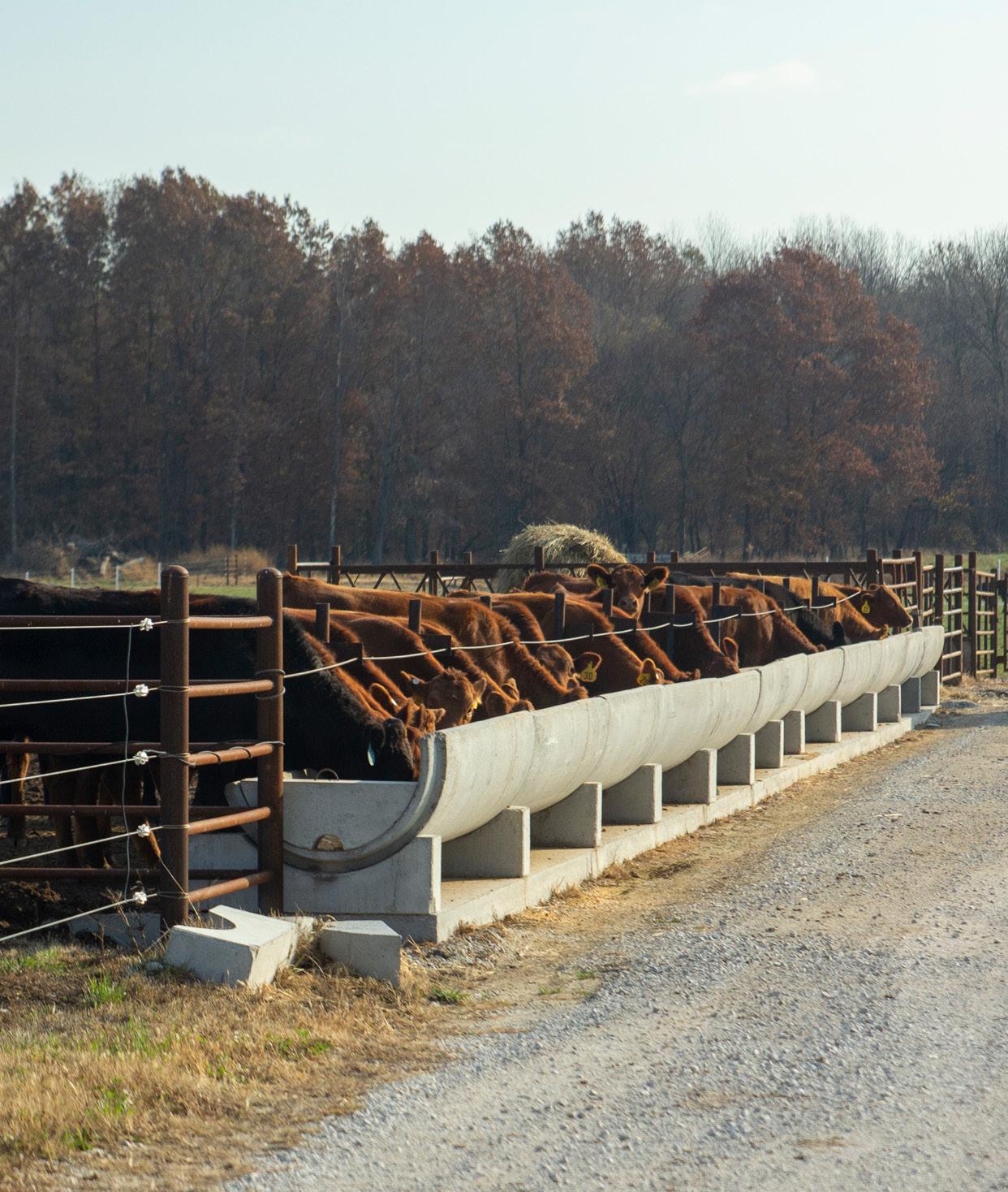
CONTENTS Show Me Youth Ag Academy Producing Producers Student-Operated Farm/Feedlot Gives Education and Experience Master Marketing There’s More to Selling Than Showing Up at the Sale Barn 36 48 FEATURES MCA President’s Perspective Doxed CattleWomen’s Corner Thank You Straight Talk: Mike Deering Legislation Built with Lies and Conspiracy Theories Regional Range Report Positive Words What’s Cooking at the Beef House Ribeye Love Capitol Update Suprised - Really Suprised 8 10 12 14 16 92 Association Update Beef Checkoff News County News 6 18 56 The Missouri Beef Cattleman is an official publication of the Missouri Cattlemen’s Association. May 2023 MEMBER NEWS COLUMNS 36 Show Me Youth Ag Academy Producing Producers Master Marketing 48 Cover Photo by Josh Ridgely
DEPARTMENTS
Magazine Publishing Office
2306 Bluff Creek Drive, #100, Columbia, MO 65201 Phone: 573-499-9162 • Fax: 573-499-9167
Andy Atzenweiler: Editor/Production/Ad Sales
P.O. Box 480977 • Kansas City, Missouri 64148 816-210-7713 • E-mail: mobeef@sbcglobal.net
Missouri Cattlemen’s Association
MCA Website: www.mocattle.com
Mike Deering • Executive Vice President - Ext 230 Mike@mocattle.com
Macey Hurst •MBC Editor/Production Artist Macey@mocattle.com
Courtney Collins, Manager of Membership– Ext 231 Courtney@mocattle.com
Lisa Stockhorst, Administrative Assistant – Ext 234 Lisa@mocattle.com
Missouri’s Cattlemen Foundation

www.mocattlemenfoundation.org
Missouri’s CattleWomen
http://mocattle.com/missouricattlewomen.aspx
2023 MCA Officers
David Dick, President
660-826-0031 • 23529 Anderson School Rd., Sedalia, MO 65301
Chuck Miller, President-Elect
573-881-3589 • 393 Spring Garden Road, Olean, MO 65064
Jeff Reed, Vice President 903-279-8360 • P.O. Box 35, Williamsville, MO 63967
Marvin Dieckman, Treasurer
660-596-4163 • 28998 Hwy JJ, Cole Camp, MO 65325
Charlie Besher, Secretary
573-866-2846 • RR 5, Box 2402, Patton, MO 63662
2023 MCA Regional Vice Presidents
Region 1: Joe Lolli, 30019 Klondike Pl Macon, MO 63552 660-346-9711
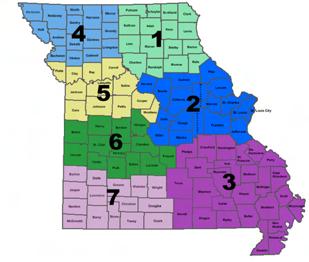

Region 2: Anita Vanderwert, 4902 Cochero Ct., Columbia, MO 65203 • 573-808-3000
Region 3: Blake Crow, 1910 W. Broadway St., West Plains, MO 65775 • 417-293-9525
Region 4: Deb T hummel, 12601 Hwy. 46
Sher idan, MO 64486 • 660-541-2606
Region 5: Alex Haun, 1031 SW 600 Rd
Holden, MO 64040 • 816-345-0005
Region 6: War ren Love, 8381 NE Hwy ZZ
Osceola, MO 64776 • 417-830-1950
Region 7: Josh Wor thington, P.O. Box 246
Dadeville, MO 65635 • 417-844-2601
MAY 2023 5 Missouri Beef Cattleman, (USPS 890-240 • ISSN 0192-3056) is published monthly (12 times a year) and is the official publication of the Missouri Cattlemen’s Association, 2306 Bluff Creek Drive, #100, Columbia, Missouri, 65201. PERIODICALS postage paid at Columbia, Missouri and additional mailing offices. Subscription price is included as a part of the minimum membership dues of $70.00 per year in Missouri Cattlemen’s Association. Postmaster: Send address changes to: Missouri Beef Cattleman, P.O. Box 480977, Kansas City, Missouri 64148 New MCA Members NCBA News USMEF Update Missouri Cattlemen Youth Expo Brangus Highlight The Case for Composite Commercial Cattle, Part 2 Obituaries 7 20 22 25-33 42 52 68
52 - Issue 5
890-240
ISSN 0192-3056)
Volume
(USPS
•
CATTLEMAN
BEEF MISSOURI OFFICIAL PUBLICATION OF THE MISSOURI CATTLEMEN’S ASSOCIATION
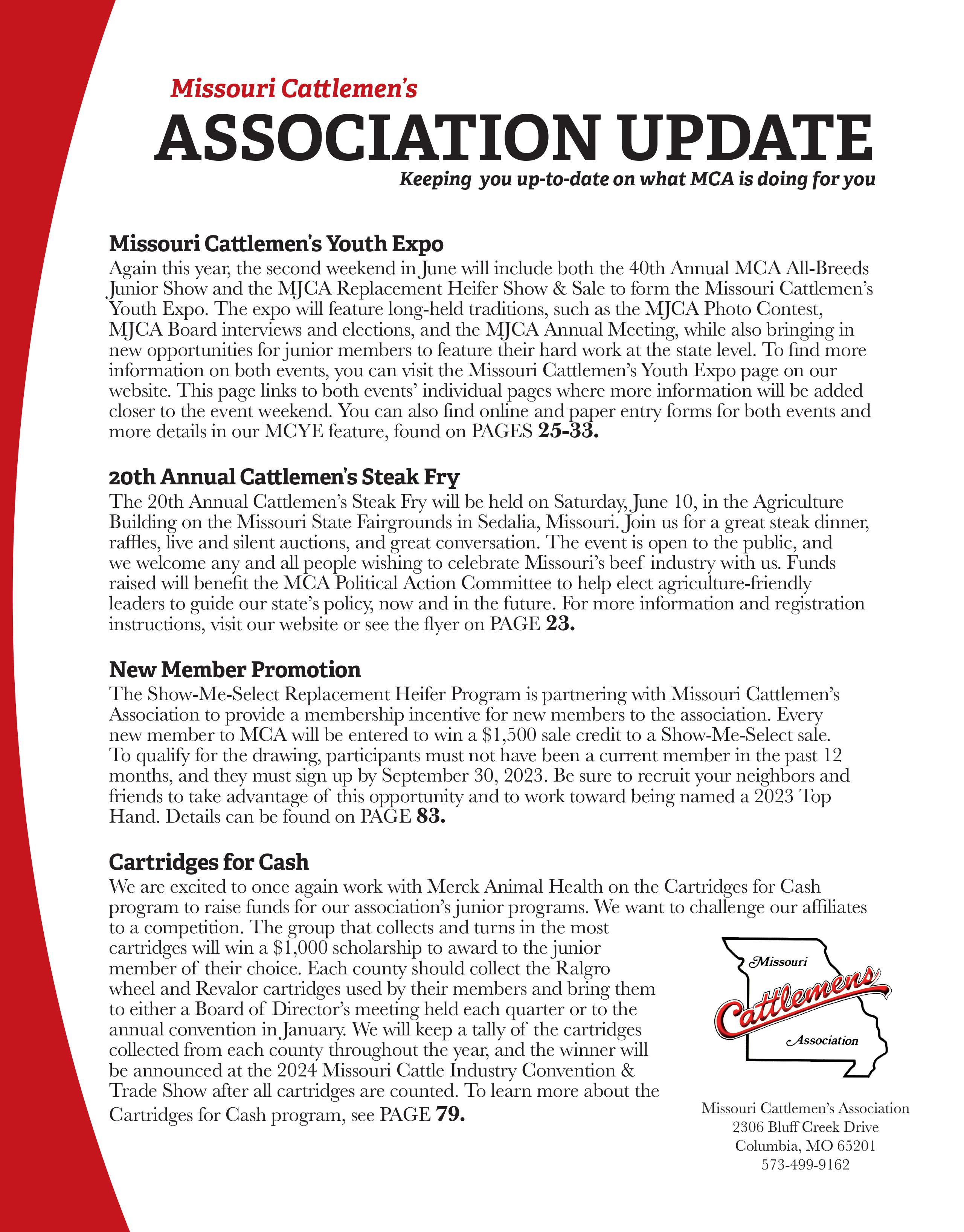
Emma Allen, Knob Noster, MO
Tristen Arnold, Concordia, MO
Doyle Bounds, Bounds Farms, Albany, MO

Glen Johnson, Brocaw Bearing & Industrial Supply, West Plains, MO

Caleb Byrd, West Plains, MO
Jill Carter, Neosho, MO
Landon Crawford, McFall, MO
Levi Crawford, McFall, MO
Maggie Cummins, Santa Fe, MO
Dave Curtis, LaMonte, MO
Casen Derks, King City, MO
Kyndri Derks, King City, MO
Stephen Derks, King City, MO
Robert Ellebracht, Sedalia, MO
Jack Grant, Joplin, MO
Stephen & Lynne Harper, Willard, MO
Brian LaBrake, Lynchburg, MO
Jennifer LaBrake, Lynchburg, MO
Dale Larson, Neosho, MO
Abigail Long, Monett, MO
Thomas Matthews, Mt. View, MO
Johnny & Barbara McNelly, Stella, MO
Britten Mergen, Green Ridge, MO
Glenn & Deborah Montgomery, Fairview, MO
Alana Nichols, St. James, MO
Larry Parks, Sunset Farms, O’Fallon, MO
David Pinnell, Cuba, MO
Mark & Rita Riemann, Stanberry, MO
Skip Schaller, Stark City, MO
Bailey Schnieder, Warrenton, MO
Buddy Sears, Selah Farms, Garden City, MO
Skylar Sears, Garden City, MO
Tony Shaffer, Butler, MO
Darrell Sondregger, Union Star, MO
Randy & Yvonna Spiva, Spiva Farm, Stella, MO
Loren Sprouse, Willow Creek Farms LLC, Braymer, MO
Cody & Madison Stanley, Rocky Comfort, MO
Dominic & Kathleen Visione, Bolivar, MO
Brian Wallace, Bolivar, MO
Jimmy Wallis, Anderson, MO
Mark & Carole Wardlaw, Stella, MO
Randy Wilson, Neosho, MO
President’s Perspective
with David Dick
Doxed
Well, I have been doxed! I heard this said and had a basic understanding of what I thought it was. But I never had the experience until NOW. I guess, more appropriately, we have been doxed. Yes, the officers and Executive Committee of MCA and our executive vice president, along with leaders of other ag organizations, have had our personal information released and published for others to use. I guess I can be polite here and say that it was used to contact us regarding the wording in a proposed bill in front of a committee in the Missouri House of Representatives. But that is me being polite and nice... What I will tell you is that the information hasn’t been used too nicely and certainly not politely! For several days, I was receiving 50 or more calls an hour around the clock. That’s not polite, and what was said was certainly not polite and totally uncalled for. I didn’t mention the texts and e-mails. At first, it was coming from out-of-state individuals from all over the United States, and I do mean from every state. Messages from Alaska, from Hawaii and received on Easter Sunday morning at 3:45 a.m. You get the drift of the volume and content, particularly nasty, offensive and accusatory, for sure. Then, when that wasn’t having the desired effect, they switched to having Missouri folks call, or at least using Missouri area codes and numbers. Once we knew what was happening and why, which happened quickly, we controlled responding so our mailboxes filled up and most of us are more controlled in answering and responding to calls. It amazes me what people think they know as fact and really don’t. It has been a good lesson in life for me. It’s just something I thought you all should know and one of the things we deal with on your behalf.
MCA is certainly busy on a lot of fronts, as we all are. The grass is green, corn is planted and the legislature is winding up to full speed as it approaches its end shortly.
MCA President
Following the March 31 meeting, the MCA Board of Directors visited the South Farm of the University of Missouri to eat lunch, have a presentation from Brian Weigand and staff, tour the facility, and, of course, look at the steers on feed in the “Top 100” Profitability Challenge. It was a beautiful day and the information shared was beneficial. The cattle looked good, as well!
We are preparing to go to Washington, D.C., to participate in the NCBA Spring Legislative Conference. Our group will be larger than normal as we have several folks from the Missouri Cattleman’s Leadership College joining us as they complete the MCLC program. We are playing catch up as NCBA hasn’t had a spring conference for a couple years. Hill visits are lined up, and presentations from agency leaders and other officials will be part of the conference.

MCA is also preparing for the Missouri Cattlemen’s Youth Expo, containing the MCA All Breeds Junior Show, Replacement Heifer Show & Sale, and the Past President’s Steak Fry, all held in Sedalia on the Missouri State Fairgrounds. These events are certainly mainstays of our summer association activities. These events are a part of our grassroots. So come and see friends that you haven’t seen for a while, get an update on the association in person, watch the neighbor kids and friends show, and see some good cattle all in one weekend in one place.
Remind me later to tell you about a fencing story I had just recently. I will leave you to your busy schedules as we all move forward.

MAY 2023 8


MAY 2023 10

Straight Talk
with Mike Deering
Legislation Built with Lies and Conspiracy Theories
There are no mRNA vaccines currently licensed for use in beef cattle in the United States or worldwide. That’s a fact, but that doesn’t stop the fearmongering from a certain attorney from Ohio spouting misinformation on Twitter. Facts be damned, make-believe conspiracy theories are more exciting. The Missouri legislation these people are pushing is HB 1169, which is sponsored by Rep. Holly Jones (R-88), who, oddly enough, also serves as the business manager for Renz Law LLC (that certain attorney from Ohio).
According to the bill, “Any product that has been created to act as, or exposed to processes that could result in the product potentially acting as, a gene therapy or that could otherwise possibly impact, alter, or introduce genetic material or a genetic change into the user of the product, individuals exposed to the product, or individuals exposed to others who have used the product shall be conspicuously labeled with the words ‘Potential Gene Therapy Product’ unless the product is known to be a gene therapy product.”
HB1169 would allow Missouri residents to make written requests to “any entity” that “produces, sells, or distributes a product in this state with the capacity to infect an individual with a disease or to expose an individual to genetically modified material, including, but not limited to, vaccines, gene therapies, drugs, and medical interventions, shall provide any and all information related to the ways in which individuals who did not directly obtain or use such product may be exposed to the product or a component of the product.”
The bill doesn’t even mention mRNA and would apply to all vaccines used to ensure animals are healthy. Regardless of the vaccine technology, the vaccines are ‘digested’ after administration, which means their components are not present in the animal. Because the vaccine is processed
Executive Vice President
well before slaughter and there is no residue remaining, the meat is safe to consume. It also targets genetically modified organisms, which would trigger a label if any animal was fed GMO corn or soybeans. The very fact the bill refers to vaccine technology as gene therapy makes abundantly clear the proponents have little-to-no understanding of what they are trying to regulate.
This bill would have undoubtedly devalued Missouri commodities. It would have set Missouri farm and ranch families up for massive lawsuits and had a chilling effect on economic development in this state. This bill is a trial attorney’s dream come true. Maybe that’s why a trial attorney was the primary mouthpiece and driver of the legislation. Just a little theory of my own.
While the legislation was also opposed by Missouri Farm Bureau; Missouri Chamber of Commerce; Missouri Soybeans; Missouri Corn; Missouri Pork and more, Tom Renz honed in on the Missouri Cattlemen’s Association posting personal cells of MCA staff and the entire executive committee. If Mr. Renz somehow believes thousands of calls will make us back down, he’s dead wrong. We will not cave to intimidation, and we were blessed to have 10 of 14 legislators who served on the House Emerging Issues Committee demonstrate true courage. While this bill is dead, this isn’t over, and we must educate consumers and push back on those who choose to push dangerous bills like HB 1169.
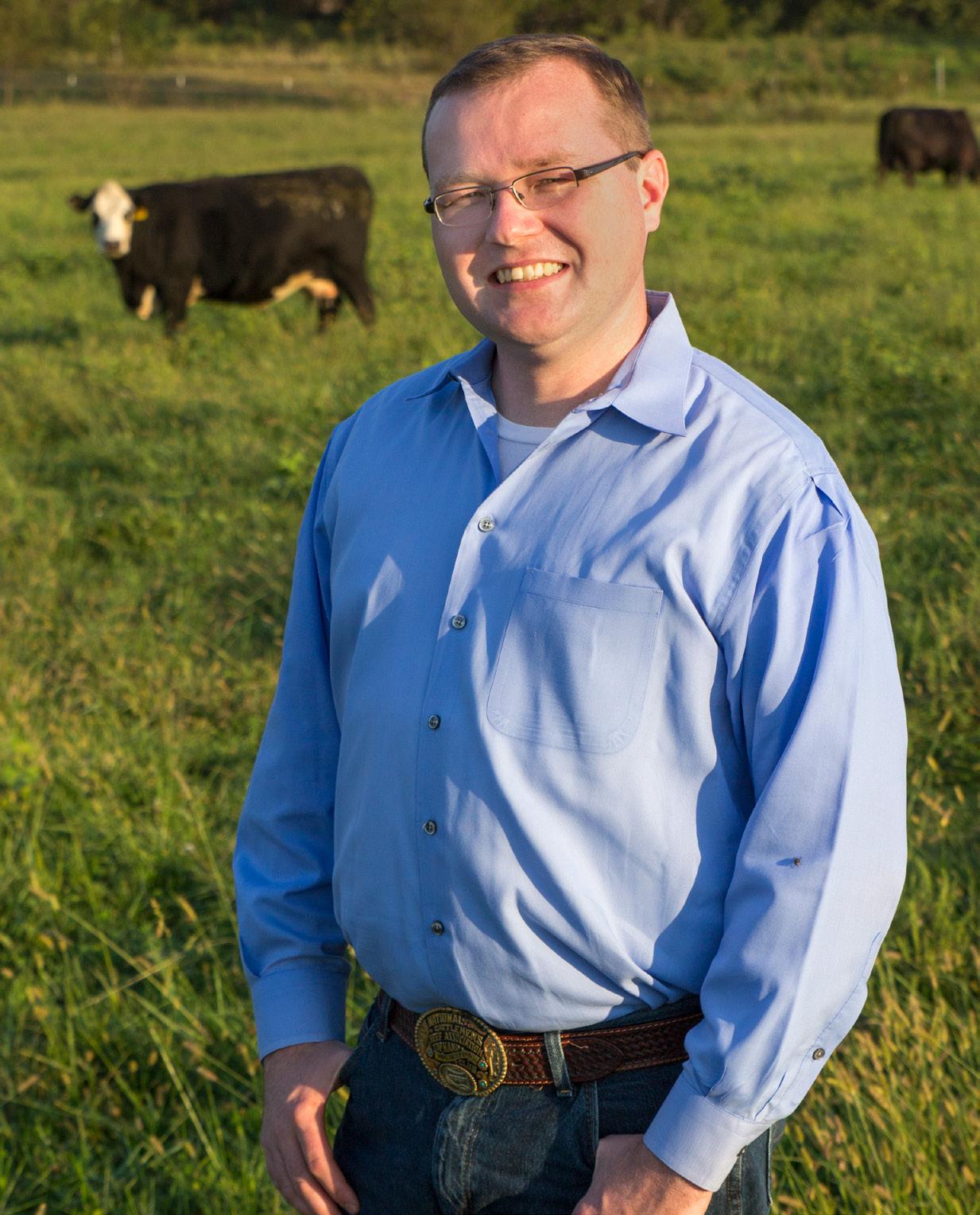

Regional Range Report

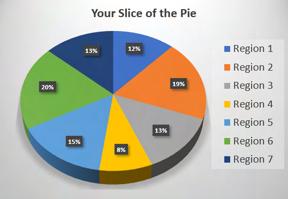 by Deb Thummel, Region 4 Vice President
by Deb Thummel, Region 4 Vice President
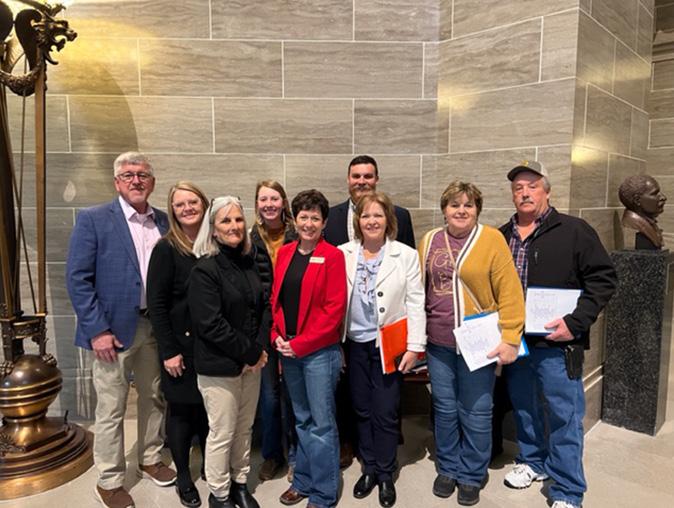
Positive Words
Up. Enthusiasm and membership are both up in Region 4. We hit an all time high membership number of 444 in late March. Yay! All of our affiliates have had their annual meetings, officer elections, and membership drives recently, and it’s quite enjoyable to see fresh new faces ready to take the reins and build upon the great foundations that were laid before them. Also up is participation from Region 4 on the state level in several different ways. I believe we added a couple lifetime memberships this past year, have had good participation at Cowboys at the Capitol this session and multiple affiliates had full delegations at the recent full board meeting in Columbia. Looking ahead, there will be several from Northwest Missouri at the Youth Expo and PAC Steak Fry in June and smiling at the Beef House come August. Additionally, members in our region are also putting more beef in the local school lunches and concession stands, while the amount of grilling beef for special events around Region 4 keeps growing, as well.
Independent. I believe that word describes all of us in the cattle industry. We just want to be left alone to do what we do so very well… raise cattle. Now, though, we need to join together to retain our independence. And we must choose carefully with whom we join. As for our independent cattle producing household, we have chosen the Missouri Cattlemen’s Association to join forces with. In our independence, we recognize the need for representation. And further, in our discernment, we recognize that the Cattlemen’s organization is best equipped to effectively work on the issues that face rural Missouri, and therefore, rural America. MCA is a leader on the national scene working to bring about policy changes at NCBA that affect the bottom line of the tens of thousands of beef producers in the state.
Green. I have never been so excited to see the grass finally grow this spring. Green grass under hoof is such an encouragement. Green is also a good color when it comes to finances. The week of April 13 brought all
Region 1 VP - Joseph Lolli
Region 2 VP - Anita Vanderwert
Region 3 VP - Blake Crow
Region 4 VP - Deb Thummel
time record high fat cattle markets, and I’m hearing of $4, four weight calves, and $3, five weight calves. I know as well as you do that these higher prices are not yet bringing in record profits, but the green is still nice to see.
Region VP. In case we haven’t met, my name is Deb Thummel, and I run a beef and row crop operation in Northwest Missouri with my husband, Jeff. We very much enjoy the reality that all three of our grown children, their incredible spouses, and our six grands are connected in and doing well in the beef industry. It’s good to have their sharp young minds and youthful energy to spur us on.
Connect. For a visual, I’m the short-statured, front-row gal clad in a red jacket in the picture. In case you need to reach me for anything at all, my cell phone number is (660) 541-2606. It’s always on, and I’m always ready for a cattle visit!
Region 5 VP - Alex Haun
Region 6 VP - Warren Love
Region 7 VP - Josh Worthington
At-Large Rep. - John Cauthorn
MAY 2023 14

What’s Cookin’ at the
Missouri Beef House
By Pat & Patty Wood, MCA Beef House Managers
Ribeye Love
Not only is May Beef Month, but it’s also a great time to spotlight one of our favorite menu items at the Beef House during the Missouri State Fair. RIBEYE… a tender steak with generous marbling throughout… is essentially individually cut prime rib roasts and comes from the cow’s upper rib area. The rib section of beef spans from ribs six through twelve. Ribeye steaks are mostly composed of the longissimus dorsi muscle but also contain the complexus and spinalis muscles.
Did you ever wonder about the origin of the ribeye name? The name “ribeye” was likely coined because the steak is found in the centermost part of the cow – the “eye” – and is the best portion of the rib steak with the bone removed.

When the Missouri Beef House was established in 1982, the vision was to promote Missouri’s beef cattle industry by serving premium beef to the crowds at the Missouri State Fair. The ribeye cut was chosen because it delivers mouthwatering, juiciness, and flavor in every bite. Ribeyes are loaded with muscle-building protein,
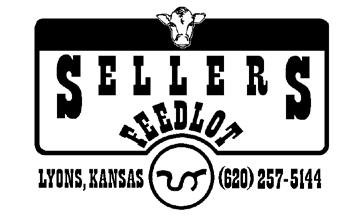

strength-stoking creatine, blood-aiding iron, energymaintain vitamin B12, and a good handful of other vitamins and minerals.
Put simply, ribeye is the steak connoisseur’s choice. During the 2022 Missouri State Fair 11-day event, we served 2025-10 oz ribeye dinners, 2024-5 oz ribeye dinners, 2417-5 oz ribeye sandwiches, and 798 Steak Salads with the ribeye steak bites. Our meat is purchased from PFG/Middendorf Meats, in St. Louis, Missouri as loins and each steak is hand-cut in house.
Come join us at the Missouri Beef House for a delicious ribeye steak served by cattle producers from across the state during the Missouri State Fair August 10-20, 2023.
Thought for the month… “What do you call it when one cow spies on another? A STEAK OUT!
MAY 2023 16
Custom Cattle Feeding • 12,000 Head Capacity Family owned & operated since 1917 Steve Sellers 620-257-2611 Kevin Dwyer 620-680-0404
Missouri Beef Industry Council Director Election Legal Notice

Notice is hereby given that the Director of Agriculture will be conducting an election to fill three positions on the Missouri Beef Industry Council Board of Directors. One regional council member is to be elected in each Region 2, 3 and 4. Terms of office are three years.
Any cattle producer within the specified regions of the State of Missouri who is producing cattle for market and the legal owner of one or more head of cattle becomes eligible to vote in the election by registering at his/her respective Farm Service Agency (FSA), or electronically at http://mda.mo.gov/councils/ prior to July 20, 2023. Cattle producers who have voted in any of the previous three elections are not required to register unless their address has changed.

The Missouri Department of Agriculture will mail ballots to registered producers on August 15, 2023. Ballots must be postmarked no later than August 31, 2023, to be valid.
Any qualified producer may be nominated and have his/ her name placed on the ballot provided the independent nomination is accompanied by petition of not fewer than 100 producers in the nominee’s region and written permission of the candidate. Petitions must be delivered to the Director of Agriculture on or before July 20, 2023. Petition forms are available from the Missouri Department of Agriculture by calling 573-751-5611.
MAY 2023 17
and Balancer® Bulls & Females Specializing in Balancers® for the Modern Rancher Ertel Cattle Company • 660-234-5265 26694 Anchor Way • Greentop, MO 63546 www.ertelcattle.com • gertel@ertelcattle.com
Gelbvieh
Your BEEF CHECKOFF NEWS

Beef Up for Beef Month
May is National Beef Month … and why not?! Warmer, longer days have finally come back around, cow-calf pairs are out grazing in green, lush pastures, and better yet, the weather is perfect for grilling – and nothing is better on the grill than a sizzling cut of beef. To commemorate our favorite month of the year (aka Beef Month), here are FOUR ways you can share in the FUN!

1. ADVOCATE: Share Your Passion for BEEF
Missouri beef producers have a long history of caring for their cattle and the environment by protecting land, air and water resources on their farms and ranches. With over 53,000 farms, encompassing more than 10 million acres which support over 4.3 million head of cattle, we have quite a lot to be proud of! Take a moment this month to share your beef story.
Pasture to plate conversations about beef’s production, care, nutrition, and sustainability are happening online, whether you take part of not. Join the conversation and shine a positive light on Missouri’s beef industry. Post a picture of your spring pairs out in the pasture or share a video grilling your favorite cut of beef.
2. JOIN US: Where MBIC Will be Throughout BEEF Month
Transitioning to road gear, the Missouri Beef Industry Council (MBIC) is taking on Beef Month full force. On May 4th, joined by Governor Parson, the May is Beef Month proclamation will take place at KC Cattle Company in Parkville, MO. KC Cattle Company is a U.S. veteran-owned, family-operated, cattle operation. From pasture to plate, they raise and market beef to the Kansas City metro area and surrounding states.
On May 5th, transitioning to the other side of the state, MBIC and a team of passionate beef advocates will be in St. Louis, joining efforts with Missouri Farmers Care (MFC) to initiate beef-centric conversations with Cardinals’ fans prior to the start of their home game at Busch Stadium. If you happen to be at the game, come find us in Ford Plaza prior to the first pitch and say howdy!
Additionally, MBIC is partnering with KMIZ ABC17 to host an online Beef Month contest. Learn how you can participate in the contest and be eligible to WIN a BEEF prize package by visiting our website and viewing our “May is Beef Month” page. Lastly, be sure to engage with us socially, as we plan to share collection of intriguing content, from cattle industry facts, to beef’s

MAY 2023 18
nutritional benefits, and lastly, our favorite, delicious beef recipes.
3. EDUCATE: Share Your Knowledge About the BEEF Industry


We live in a society, where the average American consumer is at least three generations removed from the family farm. Use Beef Month as an opportunity to meaningfully connect with those who do not have direct access to the farms and ranches where their food is grown and produced. Throw some burgers on the grill and host an informative Beef Month event in your local community. Share your beef knowledge with a group of grade school children. Invite your friends over for a beef backyard cookout. Whether it is a graduation party, a t-ball victory celebration, or simply an opportunity to connect with family and friends, beef is a yummy choice! As a friendly reminder, MBIC provides beef promotional and educational grants, which help support costs associated with beef-centric advocacy events. For more information on the grants and/or how to apply, please visit our website and/or reach out to Erica (erica@ mobeef.com) for assistance.
4. LEND A HAND: Give Back to the BEEF Industry
This month, take a moment to give back to the industry you know and love. Find a young producer who could use some mentorship and give them some production tips. Seek out opportunities at your local cattlemen’s association to give back or donate to their cause. Take a dinner (beef, of course) to a neighbor when you know they have had a long week. The opportunities to support each other within the cattle industry are endless. Use this month, as a time to uncover them and to act.
MAY 2023 19
NCBA Files Comments on USDA Traceability Rule

Emphasizes Importance of Disease Traceability and Protecting the U.S. Cattle Herd
WASHINGTON (April 19, 2023) – The National Cattlemen’s Beef Association (NCBA) filed comments on the U.S. Department of Agriculture’s (USDA) proposed rule “Use of Electronic Identification Eartags as Official Identification in Cattle and Bison” to emphasize the importance of electronic animal identification to protect the cattle industry from the threat of a foreign animal disease. USDA’s proposed rule would apply to cattle 18-months or older only when moving interstate.
“An outbreak of a foreign animal disease in the United States, like foot-and-mouth disease (FMD), would be catastrophic to the cattle industry and our way of life,” said NCBA President Todd Wilkinson, a South Dakota cattle producer. “Traceability is about risk protection and ensuring we have the tools to quickly identify and respond to an outbreak while strengthening consumer trust in our high-quality beef. Our comments emphasize the importance of protecting the U.S. cattle herd from the threat of a foreign animal disease while also protecting producers’ private data, limiting the
JAY•LOR MIXERS
cost of tagging devices, and operating at the speed of commerce.”
Without a national traceability system in place, the impact of a foreign animal disease outbreak would be magnified. For example, an FMD outbreak in the United States would lead to an immediate stop of all livestock movement for at least 72 hours. Most major export markets would close to U.S. beef and the estimated economic impact could be as high as $228 billion.
A traceability system supports cattle producers quickly returning to normal operations after a disease outbreak. Traceability data would allow producers in low-risk areas to resume transporting cattle, while helping animal health officials stop the spread of disease in highrisk areas. A traceability program also helps expedite the return to an FMD-free designation, which is beneficial for trading relationships and consumer trust in beef.
Background
As a grassroots organization, NCBA’s perspective on traceability has been developed by cattle producers who serve on the NCBA Traceability Working Group and by grassroots members who voted on traceability policy at the 2023 Cattle Industry Convention. NCBA believes that any traceability system:
• Is industry driven.
- To serve the needs and interests of beef cattle producers.

- In coordination with current and future federal, state, and tribal government animal disease traceability programs.
• Is capable of being managed and overseen by private entities that address animal disease traceability needs of the beef cattle industry in coordination with government, state, and tribal disease tracing mechanisms.
• Maintains producer data privacy.
• Is equitable to all industry sectors.
• Is compatible with common industry practices.

• Operates at the speed of commerce.
• Is credible in domestic and international markets.
• Uses electronic identification devices and electronic data transfer.
MAY 2023 20
Give Billy Bob (Gregg) Zurliene a call. He is our Jaylor, John Deere, and Tubeline expert. 618-599-2263 SNPartners.com
U.S. Cattle Producers Support Senate Legislation to Repeal Death Tax
WASHINGTON (March 30, 2023) – The National Cattlemen’s Beef Association (NCBA) strongly supports legislation introduced today by Sen. John Thune (R-SD) to repeal the federal estate tax, commonly referred to as the Death Tax.
“No cattle producer should ever be forced to sell their family’s farm or ranch to pay a tax bill due to the death of a family member. Repealing the Death Tax is a commonsense way to keep the farm or ranch in the family,” said NCBA President and South Dakota cattle producer Todd Wilkinson. “As a land-based, capitalintensive industry, most cattle producing families are asset-rich and cash-poor, with few options to pay off tax liabilities. It is unacceptable that some families are forced to sell off land, farm equipment, parts of the

operation, or the entire ranch to pay the estate tax. We need a tax code that promotes the continuation of family-owned businesses instead of breaking them up.”

Ensuring a farm or ranch can be passed to children or grandchildren is a priority for family-owned farms, ranches and agricultural businesses. It is critically important that producers and business owners have permanent relief from the Death Tax. Current Death Tax relief is set to expire at the end of 2025, and it is vital that Congress takes immediate action to provide permanent relief for agricultural families. NCBA is committed to working with Senator Thune and members of the Senate and House, those who support American cattlemen and women and rural communities to kill the Death Tax.
NCBA Highlights Federal Injunction Stopping WOTUS Rule in 24 States
With Previous Injunction Secured by NCBA, WOTUS Rule is Paused in 26 States
WASHINGTON (April 12, 2023) – Today, the National Cattlemen’s Beef Association (NCBA) praised the decision by a judge in the U.S. District Court for the District of North Dakota to grant a preliminary injunction stopping the Biden administration’s “Waters of the U.S.” (WOTUS) rule from taking effect in 24 states. Combined with a previous ruling in the Southern District of Texas, 26 states across the country are protected from the Biden WOTUS rule.
“Once again, the courts have affirmed that the Biden administration’s WOTUS rule is overreaching and harmful to America’s beef farmers and ranchers,” said NCBA President Todd Wilkinson, a South Dakota cattle producer. “Cattle producers in 26 states now have some additional certainty while this rule is being litigated and we are optimistic that the Supreme Court will provide nationwide clarity on the federal government’s proper jurisdiction over water.”
This injunction was granted thanks to a lawsuit filed by 24 state attorneys general seeking to overturn the WOTUS rule. In total, NCBA and its litigation partners have secured preliminary injunctions in Alabama, Alaska, Arkansas, Florida, Georgia, Idaho, Indiana, Iowa, Kansas, Louisiana, Mississippi, Missouri, Montana, Nebraska, New Hampshire, North Dakota, Ohio, Oklahoma, South Carolina, South Dakota,
Tennessee, Texas, Utah, Virginia, West Virginia and Wyoming. NCBA’s motion for a nationwide injunction is still pending in the North Dakota court.

MAY 2023 21 Give Billy Bob (Gregg) Zurliene a call. He is our Tubeline, John Deere, and Jaylor expert. 618-599-2263 SNPartners.com In Stock Now!
Momentum Continues for U.S. Pork Exports in February; Beef Exports Below Year Ago
Source: USMEF
U.S. pork exports remained robust in February, achieving double-digit increases over last year in both volume and value, according to data released by USDA and compiled by the U.S. Meat Export Federation (USMEF). Beef exports were lower year-over-year but improved from the low totals posted in January.
Pork to Mexico Remains Strong; CAFTA and ASEAN Regions Also Trend Higher
February pork exports totaled 219,729 metric tons (mt), up 11% from a year ago, while export value increased 10% to $596 million. This included a particularly strong performance for pork variety meat exports, which jumped 40% to nearly 48,000 mt, valued at $111.8 million – up 25% and the eighth highest on record.
Through February, total pork and pork variety meat exports increased 12% to 456,496 mt, valued at $1.24 billion (up 13%). Exports are on a record pace for Mexico and the Dominican Republic and trending
higher year-over-year to China-Hong Kong, Central America, the ASEAN region and Taiwan.
“After setting a value record in 2022, the momentum for pork variety meat exports continues this year,” said USMEF President and CEO Dan Halstrom. “While this is largely attributable to a rebound in exports to China, demand is also strengthening in other markets including Mexico and the Philippines. It also reflects an improved labor situation, which has helped the U.S. industry increase its capture rate and broaden the range of destinations for pork variety meats.”

Beef Export Volume Steady to Japan and Korea, Trends Higher to Mexico
Beef exports totaled 105,057 mt in February, down 3% from a year ago, while export value dropped 16% to $757.8 million. For the first two months of the year, exports were down 9% from last year’s large volume to just under 206,000 mt, while export value dipped 24% to $1.46 billion. February exports to Japan and South Korea increased slightly from a year ago, though value trended lower. Through February, beef exports trended significantly higher year-over-year to Mexico, the Caribbean, the European Union and South Africa.
“On the beef side, it was encouraging to see a modest rebound compared to January,” Halstrom said. “With Asian markets continuing to ease indoor mask mandates and eliminate travel restrictions, we expect to see a continued boost in restaurant traffic and foodservice demand as the year progresses.”
Lamb Exports Continue to Trend Higher
Exports of U.S. lamb muscle cuts totaled 224 mt in February, up 26% from a year ago, while value increased slightly to $1.23 million. Led by growth in Mexico, the Netherlands Antilles, the Turks and Caicos Islands and Guatemala, January-February exports increased 70% to 446 mt, while value was up 31% to $2.33 million.
A detailed summary of the January-February export results for U.S. beef, pork and lamb, including market-specific highlights, is available from the USMEF website.
MAY 2023 22

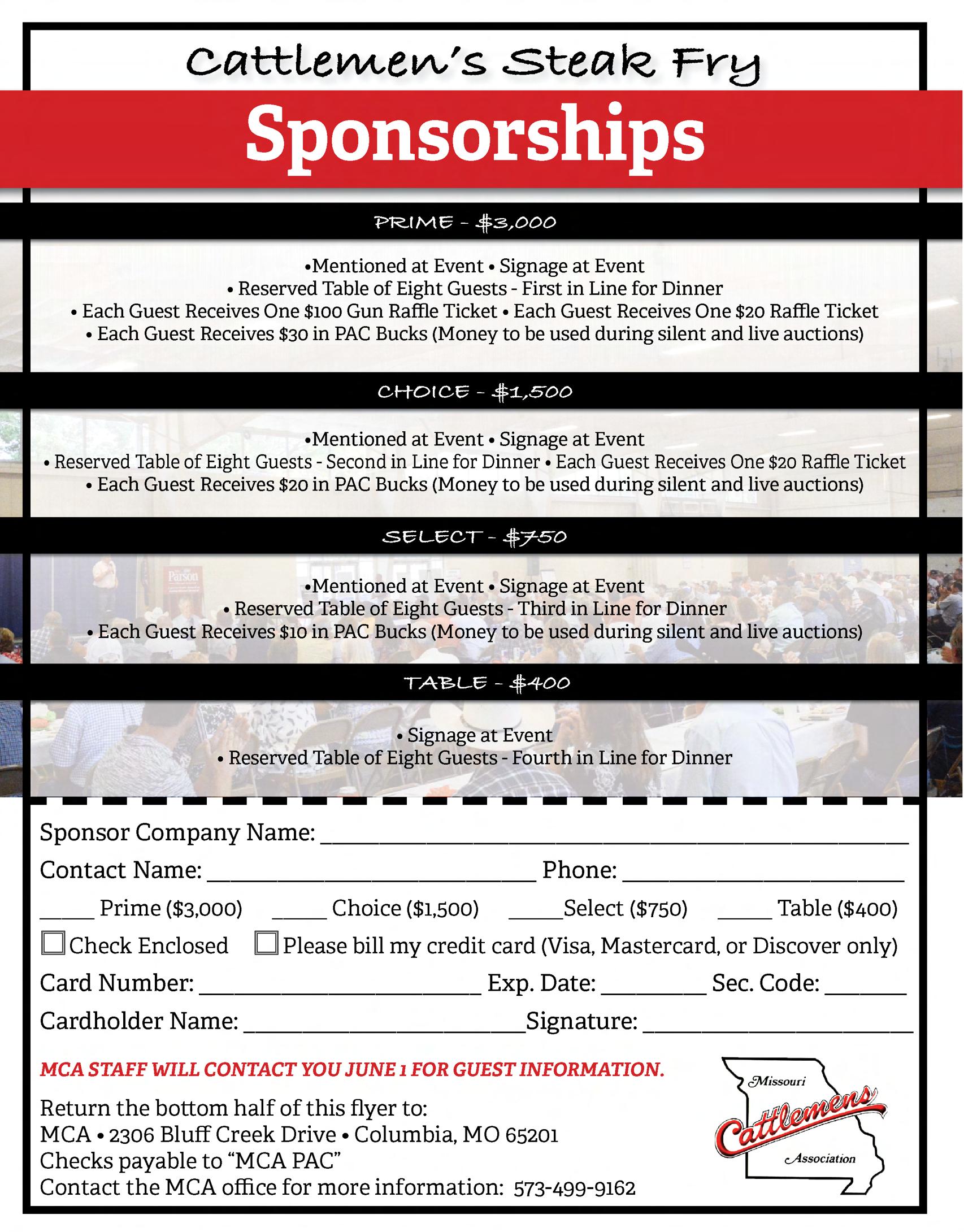






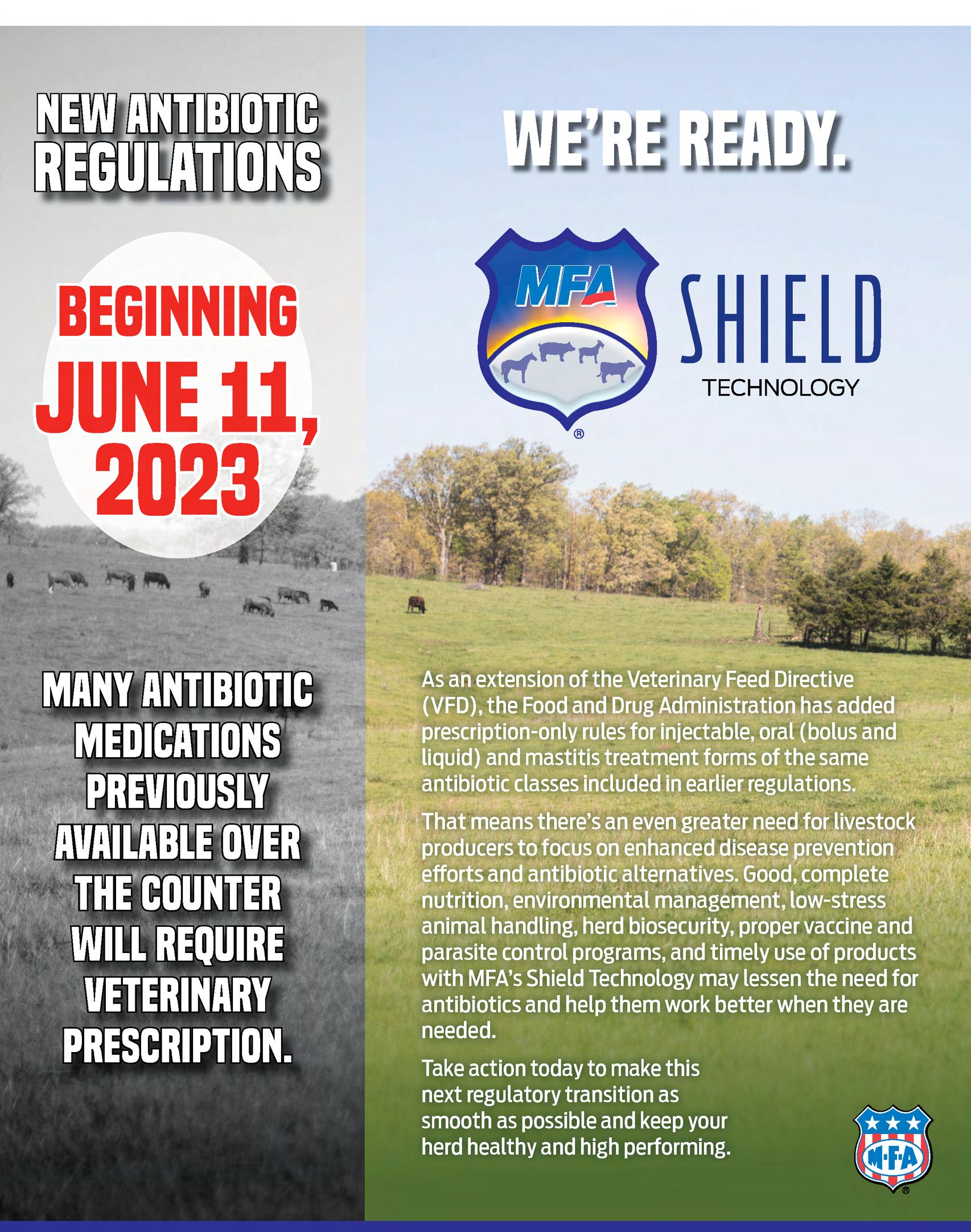



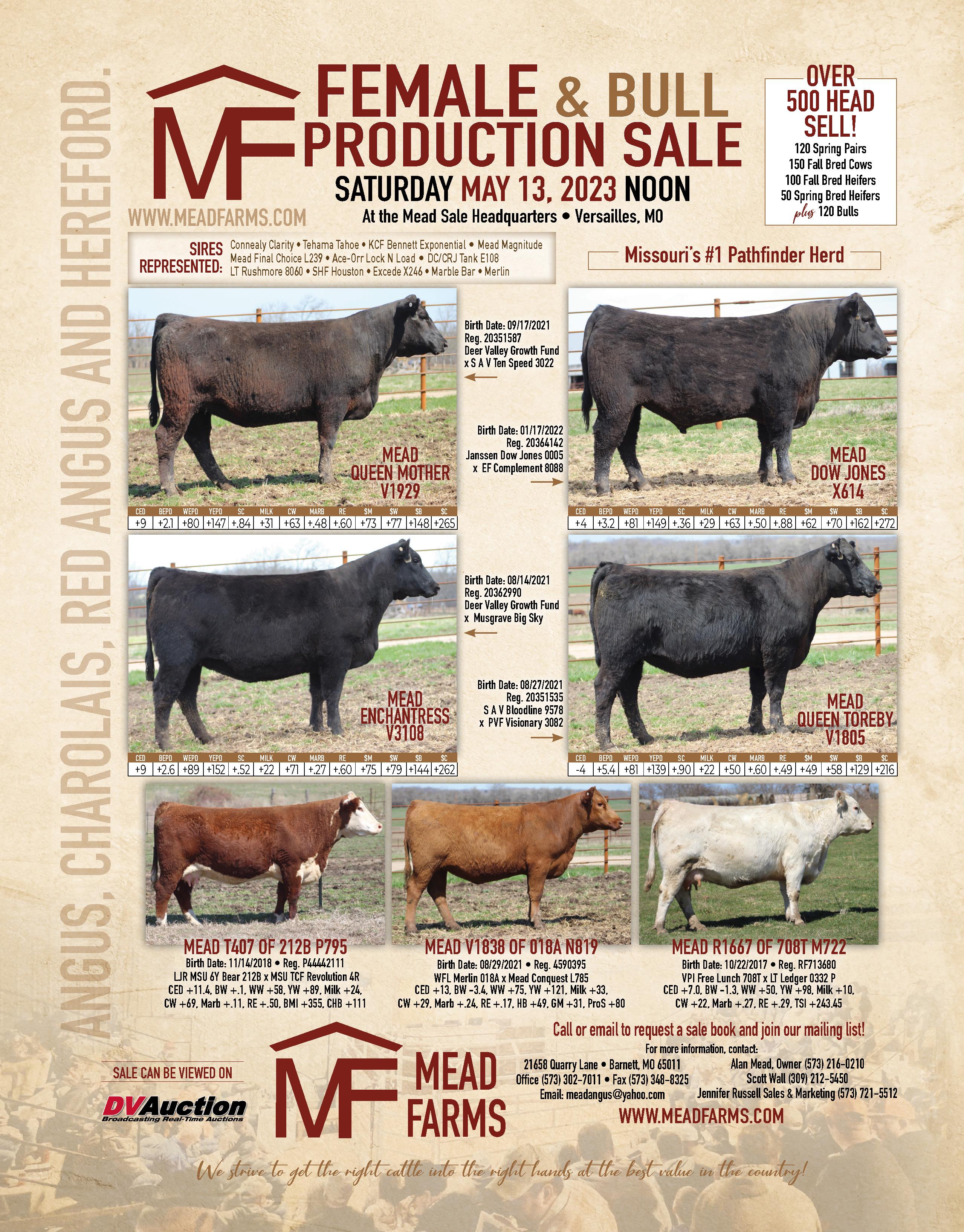

MAY 2023 36




MAY 2023 39


Loyalty and Recognition
By Lindsay L. Allen for IBBA
The Houston Livestock Show and Rodeo is one-of-akind, so the recognition and praise at the show should be just the same! At the 2023 annual International Brangus Breeder’s Association (IBBA) Membership Meeting the caliber of award winners was high and well deserving. Two awards presented in March went to Vernon Suhn, Suhn Cattle Company, for Pioneer of the Year and Brad Wright, Ranch Hand Analytics for Top Hand of the Year.
The recognition for these two individuals took place on March 2, 2023 and was a much-appreciated surprise for them both.
IBBA Pioneer of the Year
The Pioneer Award recognizes an IBBA member, past or present, for his/her service, loyalty and contributions to the Brangus breed.
Vern fits this description well and has always had his hand in the latest technology and willing to adopt new methods for managing cattle. Growing up in South Dakota in the mid-1960’s, the operation his father managed was quick to implement artificial insemination, despite the difficulty they faced in sourcing Angus semen, they were able to implement European breeds into the Angus based cowherd. Later in life, he and his wife Vicki made a move to Texas to manage Brinks Brangus, which created new opportunities for Vern to learn about this new environment and Brahmaninfluenced cattle that he had not been exposed to and be on the cutting edge of marketing advances. But a challenge never slowed Vern down and while at Brinks Brangus, the operation, which later moved to Kansas, went on to become a leader in ultrasound technology for the breed. It was here that Vern also challenged the status quo and proved that an operation could sell yearling bulls, which reduced the feed bill and got the sires in the pasture and working sooner!
Always ready for the next challenge, Vern and Vicki purchased land and began their own herd in 1990 outside of Eureka, Kansas, and began marketing their bulls. Their daughter, Jessica, said, “Dad has always concentrated on breeding Brangus cattle that would be uniform in their kind while maintaining the great natural bred-in positives found in the Brangus Breed. Those positives included great mothering ability, vigorous calves, heat tolerance, bred-in insect resistance, resistance to fescue toxicity and natural heterosis.”
Their son, Jared, said, “Starting with only 15 cows, it was a slow, methodical and planned building process. Just two years after the ranch’s inception, they incorporated an embryo transfer program. But typical of Dad’s approach his whole life, he wasn’t content to just worry about his own program. Since they had such a small herd to begin with, they worked to solidify relations with other small Brangus breeders throughout the Midwest and started developing and merchandising bulls together. The co-op model Mom and Dad began employing in the early ‘90s is now a part of many large-scale purebred operations in America today, but Dad’s philosophy and approach was to help these small breeders advance.”
“I believe the most important part of any Brangus operation is to be involved with the association,” Vern said. During his tenure as IBBA president, he was instrumental in developing the Ultrablack program and has previously been recognized as Breeder of the Year as well, confirming his history and loyalty with the breed of cattle he has come to love.
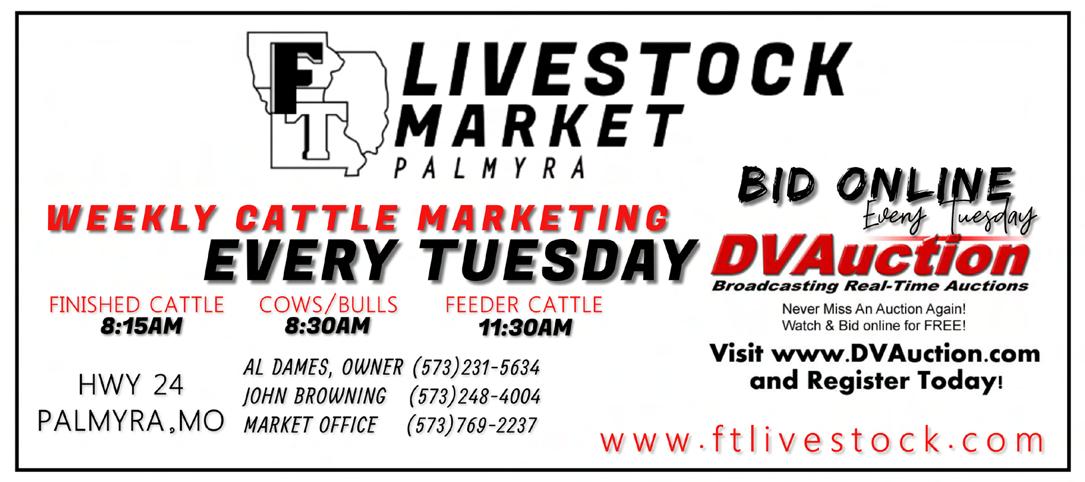
Continued on page 44

MAY 2023 42
Pictured left to right are Joe Fuller, Jared Suhn, Jessica White, Vicky Suhn, Vern Suhn, and Mike Weathers.
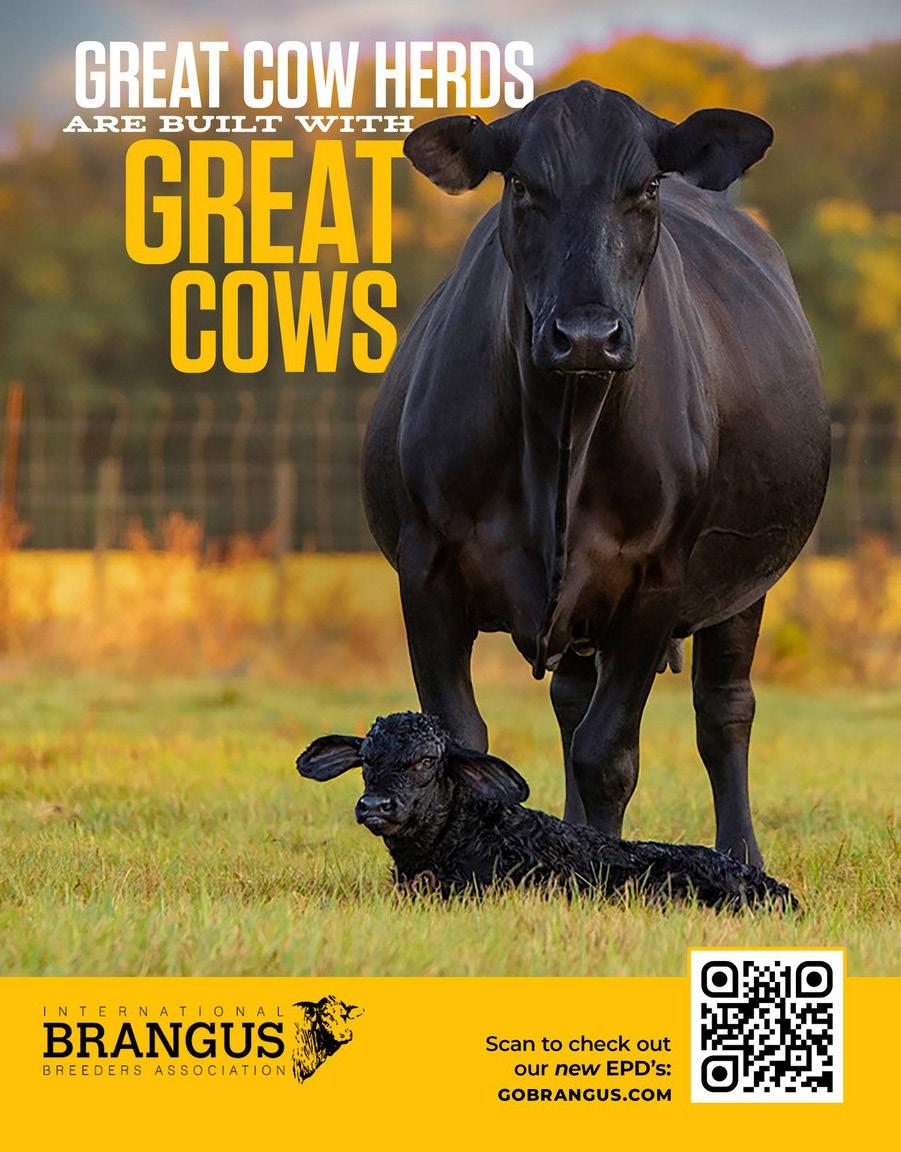
His contributions to the breed continued when he was given the lead on forming GENETRUST, a program that consisted of several individual programs, with one philosophy and a united approach to breeding and merchandizing cattle.
“Through this successful program we took the same approach that we took with our own bull development center and allowed not only partners of GENETRUST to sell their bulls and females, but also other breeders were selling their cattle through these sales. This alliance lasted for 10 years when myself and others decided to split off and form GENEPLUS. It has been rewarding to see this new group succeed and raise the standard even higher on our selection process for sales,” Vern shared.
When asked what this award means to him, Vern said, “I am humbled and honored to be recognized by my fellow breeders. It is a privilege to receive this award and stand beside others who have received this award, especially my mentor, Glenn Brinkman, who was the first recipient. I would also like to acknowledge my wife, Vicki and our children, Jared and Jessica, for their hard work and unwavering support in helping me attain our goals and the success we have achieved.”
IBBA Top Hand of the Year
“When you think of a top hand, it’s an individual who will get the job done and then some, without cutting corners,” Dr. Darrell Wilkes, IBBA executive vice president, said, “A top hand goes above and beyond in their service and that is absolutely true of this year’s winner, Mr. Brad Wright.”
Brad is the founder and owner of Ranch Hand Analytics, LLC, a company focused on helping producers make data driven decisions. “Too many times, producers collect data points because a breed association, marketing program, or public perception demanded it, but they never actually use the data to make their product and their program better,” Brad continued, “That is my real passion; utilizing all available information to help producers make management decisions that put their programs on the leading edge of the industry.”
Brad has used his passion to help further the Brangus breed as he has worked closely with the association to help build a new software program for registry and performance data tracking. Dr. Wilkes added that Brad has continually made himself available and provided sound advice throughout the process.
While Ranch Hand Analytics provides services for a number of breeds, Brad’s history and love is with the

Brangus breed, which is why he has personally made himself available throughout the software building process.
He grew up around the breed, as his dad managed a Brangus operation and in college, and after graduation, Brad worked at Ultimate Genetics, a sister company to Camp Cooley, where he saw a number of Brangus sires and their impact. From 2010 – 2014 he worked at American Marketing Services where he managed Brangus sales and ultimately founded Ranch Hand Analytics in 2014.
“The thing I love about the Brangus breed is the innovation and drive for performance data. As a whole there are things we do, from ultrasound to total herd reporting, that are common nature to Brangus breeders that others are struggling with,” he shared, “The Brangus breed collects data very well and then makes decisions based on the performance data.”
The impact Brad has had on the breed and the association’s work in collecting data has built a favorable reputation for him and Ranch Hand Analytics. Brangus members describe Brad as smart, confident, always there and admit they don’t know what they would do without him. Dr. Wilkes added that Brad is not intimated by “complicated” and is thankful for his dedication to furthering the Brangus breed and supporting Brangus breeders. Brad’s passion for the breed doesn’t start and stop with advising from a software aspect though, he has been an IBBA member for 13 years and served on several committees too.
It’s this level of service, loyalty and passion that led to the easy selection of Brad Wright as this year’s Top Hand of the Year.
Congratulations to Vern and Brad on their welldeserved awards.
MAY 2023 44
Pictured left to right are Jeremy Jackson, Wade Fisher, and Brad Wright.

Award Winning Brangus Breeders
Source: By Lindsay L. Allen for IBBA
The International Brangus Breeders Association (IBBA) is made up of a number of high quality, performance driven breeders, which means that to rise to the top of this elite group is no easy feat. However, at the annual IBBA meeting held at the Houston Livestock Show and Rodeo in March, awards were given to those who had done just that; risen to the top as a result of their years of dedication and improvements to the breed.
Genesis Ranch and Darrel Law & Sons Cattle Company were two operations that went home with a coveted award--Breeder of the Year and Commercial Producer of the Year, respectively, in recognition of their utilization, advancement and promotion of Brangus genetics within their herd.
Breeder of the Year – Genesis Ranch
Mike Weathers, owner of Genesis Ranch, is the 2023 recipient of the IBBA Breeder of the Year Award. Weathers bought his operation in Columbus, Texas in 1995 and soon after began buying commercial Brangus cattle and eventually, registered Brangus.
“I was a commercial breeder, but got connected with Camp Cooley and that led to my registered herd,” he said, “In 2004 I joined the association and felt like it was my responsibility to participate so that I could do my part to help the association move forward as much as I could.” His involvement includes two terms as the Texas Brangus Breeders Association (TBBA) president and a three-year term as the IBBA secretary / treasurer.
Weathers primarily focuses on his bull development and sells a majority of them by private treaty and also uses donor cows for embryo work. He is focused on finding the right breeders to take his bulls home and said, “I always visit with potential buyers and ensure they understand the commitment it takes to develop a registered herd. I want to make sure they are committed to the work and financial responsibility of it all because if not, it does the breed zero favors.”
As a founding member of GENETRUST, Weathers made an impact on the group with his knack for numbers. He was able to figure out how to execute a complicated sale structure according to Fuller, which traces back to his career in the banking and bond trading industry. Fuller added that Weathers’ can be credited for his role in helping the IBBA and TBBA during financial stress and his leadership as the TBBA Sale Chair is the reason why the TBBA Spring
Spectacular sale, which is the number one consignment sale in the breed, is so successful.
Mike is always striving for the next great bull or donor female and loves the Brangus breed for their health, heat tolerance, heartiness and said, “I’ve just always liked black cattle and Brangus has been a great fit for me. I love raising Brangus cattle.”
“This award means a lot to me, it shows appreciation for what I am trying to do and how my operation fits into the over picture for the breed. I want to continue to keep contributing to that,” Weathers said.
Commercial Producer of the Year – Four L Farm
Four L Farm, owned by Darrel Law, wife Connie, and sons Brad and Clint, traces back to the early 1960s with Darrel’s father, Cillous. The operation, located in North Central, Tennessee and South Central, Kentucky, runs commercial Brangus and Ultrablack cattle, in addition to winter hay and rotational grazing from fescue, clover, and rye grass.
In 1982 he purchased his first purebred Brangus and throughout the 1980’s and 1990’s additional cows were added to the herd from across the Southeast. “In the 2000’s we began marketing our Brangus and Ultrablack breeding stock with cooperator programs.
Vern Suhn, IBBA member, said at the presentation ceremony that Four L Farm has produced steers that are highly sought after. As for the people aspect as Four L Farm, Suhn said, “Darrel enjoys visiting with friends, colleagues and new acquittances about his experience with and the benefits of Brangus and the Ultrablack breed…Darrel and his sons continue to listen to the needs of the cattle industry and integrate the proper genetics through the analyzation of performance information, genomically enhanced EPDs and phenotypical appraisal in the production of a female base that fits the needs of the feedlot and packer, but is also functional and reproductively efficient and will be an asset in a variety of applications.”
Reflecting on his time in the breed, Darrel said, “By being on the IBBA Board of Directors for two terms and involved with the Brangus breed for over 35 years, I have been blessed to meet and make lifelong friends that also have a passion for the Brangus breed. There are far too many people to mention that have had major impacts in helping our program be successful. Our plan is to continue to raise high quality cattle for the next generation.”
MAY 2023 46



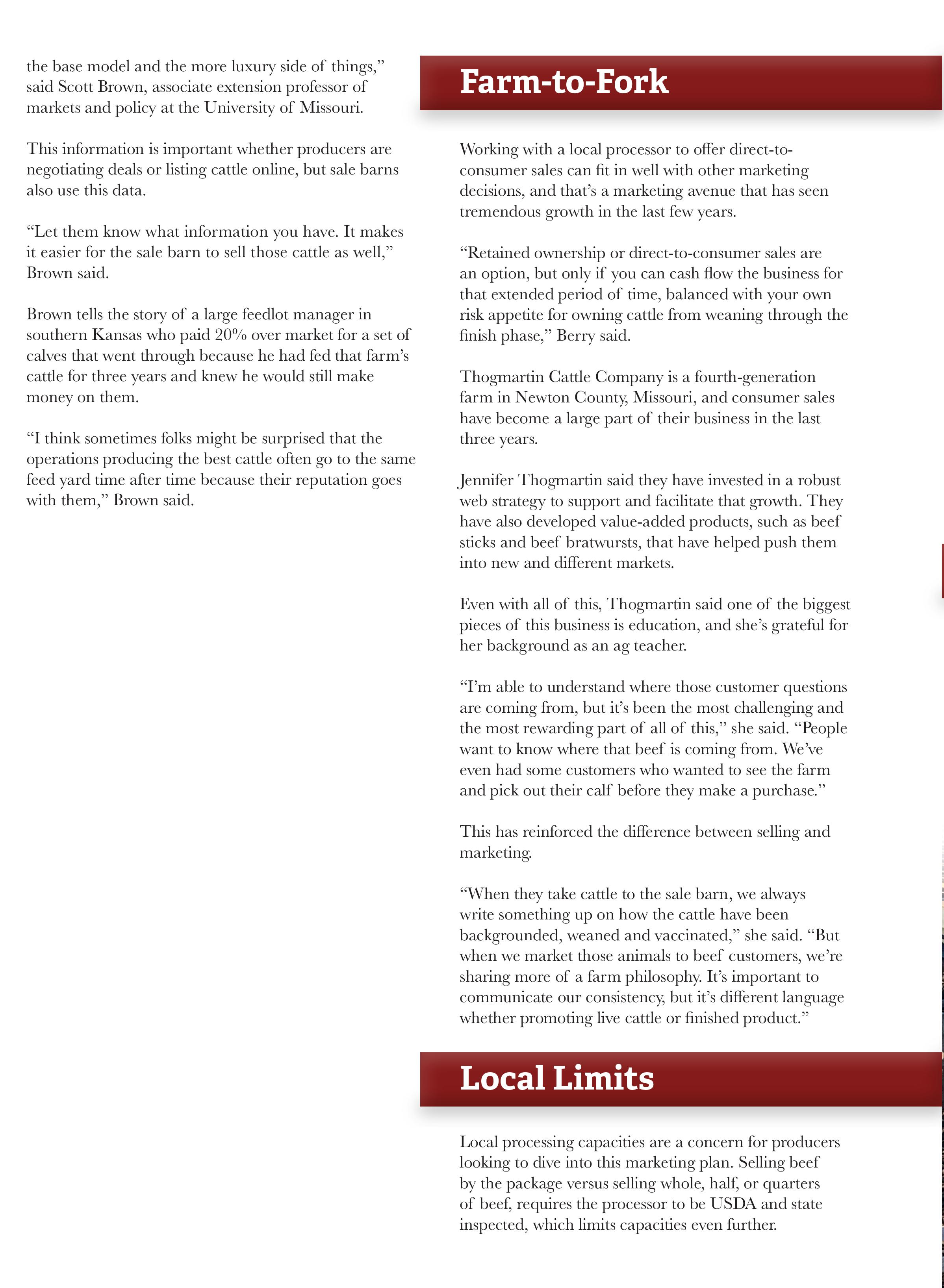


MAY 2023 50 David Igo • 660-631-2310 Marshall, MO Don’t Just Mix Your Ration Blend It… With an NDE Vertical Mixer

The Case for Composite Commercial Cattle, Part 2

In part one of this series, I defined composite cattle and developed a list of criteria for judging any crossbreeding system. The list is reproduced below. You can find a more detailed explanation of the list in the first article. My purpose in this second article is to evaluate composite breeding systems for the criteria in the list, and, in doing so, give you a feeling for the relative strengths and weaknesses of composite cattle.
Criteria for Judging a Crossbreeding Program
1. Merit of component breeds
2. Level of hybrid vigor produced (HV)
3. Simplicity (EASE)
4. Replacement considerations (REPS)
5. Complementarity (COMP)
6. Consistency of performance (CONS)
A basis for comparison: the traditional three-breed pasture rotation
To see how composite cattle stack up for these criteria, let’s first establish a baseline by evaluating a betterknown traditional system: the three-breed pasture rotation. In this system, there are three breeding pastures. Purebred bulls of three breeds are assigned to these pastures, one breed per pasture. Cows are allotted to pastures according to their breed composition; those with the least amount of a particular breed in their background are assigned to the pasture containing bulls of that breed. Replacement daughters, having different breed composition than their mothers, will be bred to a different sire breed. As shown in the Figure 1, the entire scheme appears graphically as a rotation, with replacements moving sequentially from their dams’ breeding pasture to the next breeding pasture in a circular fashion.
Hybrid vigor, replacement considerations, and accuracy of genetic prediction. My evaluation of the threebreed rotation is summarized in the accompanying “report card.” The system does well (scores a “+”) in the hybrid vigor category. A large proportion of F1 or maximum achievable hybrid vigor — in theory 86% — is maintained with the rotation. The system also scores well in the replacement category because it produces all its own replacement females. Accuracy of genetic prediction is good, too, because the purebred bulls used are likely to come with state-of-the-art EPD.
Simplicity. The three-breed rotation is not simple from a management standpoint, however. It requires at least three breeding pastures, and if heifers are bred separately from cows, an additional one to three pastures. Fencing, sorting animals, and keeping bulls in the right pastures can be painful. With cattle divided among a number of pastures, opportunities for high density/short duration grazing and related grazing

MAY 2023 52
Figure 1: Three-breed pasture rotation
schemes are limited. Furthermore, the system is infeasible for small herds — those using less than three bulls.
Complementarity and consistency. The three-breed rotation fares poorly for complementarity and is questionable for consistency of performance. Because breed composition varies considerably within the herd (cows can be as much as 57% of a particular breed or as little as 14% of the same breed), the only way to be sure of consistent performance is to use breeds that are very similar in biological type. Doing so, however, rules out any possibility of breed complementarity. You could not, for example, use one breed that excels in milk production and another that excels in growth rate (a classic complementary combination) without producing sets of calves within a crop that differ a good deal in these traits. So if complementary breeds are used, consistency suffers, and if breeds are chosen for consistency, complementarity is eliminated.
small herd; seven herds with only one sire, and with composites there should be no conflict between the breeding program and forage management. I give them a “++” in the EASE category.

Replacement considerations. Like straightbreds, composites produce their own female replacements, so composites score well for replacement considerations. Composites have the potential to produce their own replacement males as well, though for most commercial producers the extra level of management and record keeping required to do a good job of home-raised bull selection is probably impractical. Most composite bulls will be purchased from composite seedstock producers.
Hybrid vigor. Composite animals exhibit considerable hybrid vigor. For those of us schooled in the importance of crossbreeding for maintaining hybrid vigor, the idea of getting sustained vigor without crossbreeding may seem like voodoo genetics. In fact, it is an algebraic consequence of hybrid vigor theory. The amount of vigor depends on the number and proportions of component breeds in the composite. To get an idea of the fraction of maximum (F1) hybrid vigor that is maintained in advanced generations of a composite, you can use the following formula:
The “pure” composite breeding system
Simplicity. Now consider the use of an existing composite breed. From a management standpoint, breeding composites is like breeding straightbreds; only one breeding pasture is needed (two if heifers are bred separately). All the problems associated with having multiple breeds are eliminated, and for this reason, the greatest virtue of a composite program may well be simplicity. Composites can be used successfully in

Proportion of F1 vigor retained, where pi is the proportion of the “ith” breed in a composite made up of n component breeds, and ∑ is the mathematical symbol for summation.
Continued on page 54

MAY 2023 53
The formula looks worse than it really is. Take the RX3 breed for example. RX3s are 1/4 Hereford, 1/4 Red Holstein, and 1/2 Red Angus. The fraction of maximum hybrid vigor retained in RX3s can be estimated as:
take advantage of their complementary characteristics. (Note that this would be an unlikely pair of breeds to use in a rotational system using purebred sires; the fluctuation in offspring types would be too large.)
The composite/terminal system
In other words, RX3 cattle can be expected to exhibit 63% of the hybrid vigor typical of a first cross animal. A four-breed composite with equal fractions of each component breed would be expected to show 75% of F1 vigor, a similar eight-breed composite 88%. These are respectable amounts of hybrid vigor. Hence the “+” rating for composites in this category.

Breeders often ask, “After a while, won’t a composite breed become just another breed?” In other words, won’t composites lose their ability to retain hybrid vigor over time? The answer is no if inbreeding is avoided. On the other hand, if the composite breed is allowed to become inbred, as purebreds are, it will indeed become just another pure breed.
Consistency. Composites score high for consistency of performance. This comes as a surprise to many. Classical genetics texts are full of examples of increased variation in the progeny of hybrids. The books are not wrong, but the examples inevitably involve traits that are affected by just a few genes, so-called qualitative traits. In beef cattle, coat color is an example of a trait of this kind, and if the component breeds in a composite differ in color, the composites will be of many colors as well. The same is not true for quantitative traits affected by many genes. These include the majority of economically important traits: fertility, survivability, growth rate, milk production, carcass characteristics, and so on. Experimental data suggest that composites are as uniform for these traits as purebreds. And when compared to hybrids from a rotational crossbreeding system, composites are inevitably more uniform because they do not vary in breed composition.
Complementarity. Does a composite breeding program make use of complementarity? Strictly speaking, no. Because the cattle within a composite population are all of the same basic biological type, there is little opportunity for complementarity from composite matings — no “big bull–small cow” possibilities. However, complementarity does come into play in the formation of composite breeds. We could, for example, include both Herefords and Holsteins in a composite to
Simply breeding composites to composites as though they were purebreds is not the only way to use composites commercially. A modified scheme (and, I confess, a favorite of mine) is the composite/terminal system. In this system, about half the herd of composite females, typically consisting of the heifers and younger cows, is bred to composite bulls, and the other half is bred to terminal sires (see Figure 2). Replacement heifers come from the composite matings, and all terminally sired offspring are marketed. Such a system involves an additional breeding pasture, but this modest loss in simplicity comes with an additional measure of complementarity (big bull–small cow) and hybrid vigor.
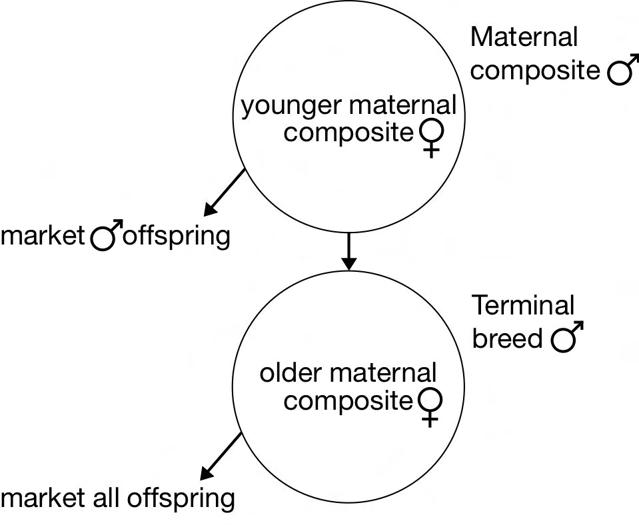
Other considerations
“Niche” cattle. As you can see from the “report card,” composite cattle have a lot going for them and relatively few drawbacks. Composites have some additional attributes not readily apparent from the report card. They can be designed to fit a specific environment or niche. The Barzona breed is a good example. Barzonas were developed specifically for the desert Southwest, and they combine characteristics from several breeds that make them particularly adapted to that environment. Wherever the environment poses unique challenges, there is an opportunity for an appropriately designed composite breed.
Reduced variation industry-wide. Composites have the potential for “standardizing” commercial cattle, thus reducing the variation we currently see in market animals. This statement may seem counterintuitive; how can variation be reduced by adding more breeds to the already large number of breeds available? Look at it this
MAY 2023 54
Figure 2: Composite/terminal system.
way: Today’s problem cattle from a feedlot and carcass perspective tend to be biologically extreme animals. They are either purebreds or high percentage animals from extreme breeds or crosses of similarly extreme breeds. In other words, they are the result of poor crossbreeding decisions by commercial cattle breeders. With a composite breed, crossbreeding decisions are made when the breed is formed. Thus the decisions as to what breeds to put in the crossbred mix are taken out of the hands of commercial producers and placed in the hands of a much smaller number of composite seedstock breeders. Yes, commercial producers still decide what composite breed to use, but they are unlikely to find an extreme one. That is because (with rare exceptions) composites are expected to be complete and balanced in performance, and only those composite breeds that fulfill this expectation are likely to survive. In other words, the variation among composite breeds will be considerably less than the variation we now have among pure breeds.
Commercial or seedstock? Finally, composite cattle break the seedstock/commercial barrier. With traditional crossbreeding systems, crossbreds are the commercial cattle of choice due to their hybrid vigor, but only purebreds can be seedstock. Composites can be either





or both. There is no genetic reason why a herd of good commercial composite cattle could not become a seedstock herd.


Will composite breeding systems be the wave of the future? That depends on the willingness of both seedstock and commercial breeders to break with tradition.
It took a long time for cattle producers to accept the idea of crossbreeding. Acceptance of the composite concept may take just as long. However, the case for composite cattle is a strong one, and if common sense prevails, we will see increasing numbers of composites in the relatively near future.
Dr. Rick Bourdon taught at Colorado State University’s Department of Animal Sciences, first as an assistant professor and later an associate professor, for 15 years. His work focused on beef cattle breeding, genetics, and more. Bourdon also served as the Executive Director for the Red Angus Association of America. He has authored or coauthored over 200 professional and popular press articles, book chapters, and abstracts on topics related to beef cattle breeding and genetics.

MAY 2023 55
S T E A K S A L I V E For More Information About Simmental Cattle Please Visit: MissouriSimmental.com For Your Simmental Needs Contact One of These Missouri Breeders… Durham Simmental Farms For Your Simmental Needs Contact One of These Missouri Breeders… Bulls For Sale! Quality Simmentals for Over 50 Years Oval F Ranch Don Fischer • Matt Fischer 816-392-8771 • 816-383-0630 Winston, MO • St. Joseph, MO SLAYTON FARMS Specializing in only RED SIMANGUS Bulls & Females Barry Slayton 417-293-2214 • West Plains bslayton48@gmail.com SimAngus Bred Heifers & Bulls For Sale Vanderwert Wayne Anita Ethan 303-506-3508 • 573-808-3000 • 573-303-8234 15 min off I-70 from Columbia, MO (816) 390-7933
COUNTY NEWS
Andrew Buchanan Cattlemen
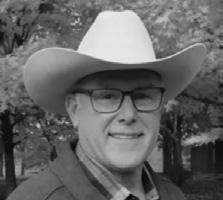
The Andrew Buchanan Cattlemen’s Annual RoundUp Fundraiser was held Saturday March 11, 2023. Timberidge donated the event space for the evening. We want to thank all our sponsors and those who helped to make the evening a success! We raised approximately the same amount as we did in the previous year. The evening started at 5 p.m. with a happy hour, and dinner was served at 6 p.m. MCA Region 4 Vice President Deb Thummel gave a blessing before we began the meal. ABCA President Doug Johnson later gave a quick overview of our year and presented the 3 - $1,000 scholarships that we awarded for the coming school year. Ella Jordan, freshman at K-State; McClane Johnson, senior at Savannah High School; and Kyle Houston, senior at North Andrew, were the recipients. We also gave the state an additional $1,000 to award at the state level. The auction took place after that.

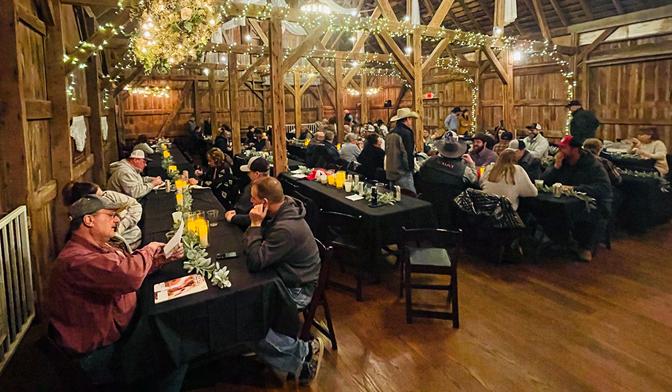
We would like to thank our many sponsors: Acklin Veterinary Clinic; Savannah Veterinary Clinic; Al Landes; Alan Kapp, Vit A Zine; Altec; American Angus Association; Anchor D Western Designs; Austin Elder, American Family; Biozyme; Bunse Seed; Burnt Ends BBQ; Central Commodities; Certified Angus Beef; Clarks Meats; Coop of Maryville & Purina LLC; Davis Distributing; Derr Equipment; Devan Rolofson Baked Goods; Dishman Fertilizer; Don and Marilyn Fischer; Jason Sarsony, Edward Jones; El Rey Papis; Fair Oaks Farm; Julie Feeser; Family Center Farm & Home; Farm Credit Services; Jalyn Sybert, Felix Street Gourment; Heritage Tractor; Houston Angus; HyVee; Trisha Dalbey, Indigo Ag; Joel Osborn; Joe’s Barber Shop; Kate Fischer; Kevin and Julie Valasek; KK Farms/ Windy Wine; Kyle Davidson; Miles and Holly Mitts, Lazy L Cattle Co.; Mary Kay Lyle; Matt and Andrea
Specializing in Land Equipment and Livestock

For Upcoming Sale Info: www.wheelerauctions.com
See What’s Happening in Your County
mwauctions@ctcis.net
Fischer; MCA; MFA of Savannah; Jeff Anslinger, MLS; Missouri Wine and Grape Board; NA FFA; Nodaway Valley Bank; Cody Cornelius, Northwest Performance Ag; Dustin Schneider, Oakley Ag Repair; Pickup Palace; Reed Automotive; Reed Chevy; Rockridge Steel; Ron Leeson; Savage Service Center; Savannah FFA; Savannah Fire Department; Schweizer Farms; St. Joe Boot Co.; St. Joe Tractor; Andrew VanSchoiack, Stein Soybeans; Sur-Ag; Texas Roadhouse; The Sports Page; Tyler and Devan Rolofson; United Electric; UPCO; Veale Ag Solutions; Victory Chevrolet; Walton Ford; Ware Hardware; Wells Bank; Wiggle Yer Worm ; and Chris Schoen, Zoetis.
MAY 2023 56
Contact: Mike Williams Higginsville, MO 816-797-5450
Missouri Angus Breeders
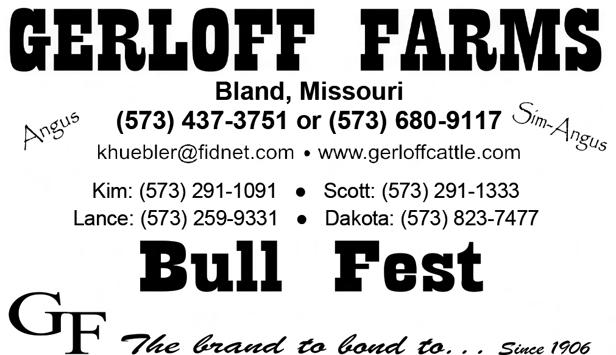
The #1 State For Angus!
9770 W. State Hwy 266 • Springfield, MO 65802
Jim 417.827.0623

Joann 417.827.2756 clearwaterangus.com

Bulls & Females | Quality Angus Beef
October 14, 2023
Registered Angus Cattle For Sale

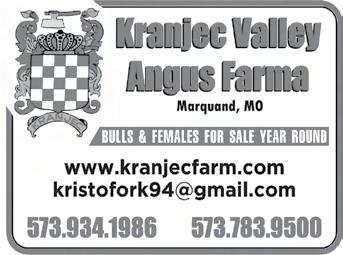




Drew & Tasha Busch 10761 Maries Co. Rd. 424 • St. James, Mo 65559 Office 573-699-4085 • Cell 573-864-6896 BuschCattleCo2001@gmail.com
For
Saline 127 Hwy • Malta Bend, Mo 65359
Marshall • (660) 641-4522

21658 Quarry Lane • Barnett, MO 65011
Office: 573-302-7011 • Fax: 573-348-8325
E-mail: meadangus@yahoo.com
Website: www.meadfarms.com

Alan Mead, Owner 573-216-0210

Julie Conover, Executive Director 634 S.W. 1201 Rd • Holden, MO 64040 734-260-8635
E-mail: Julie@missouriangus.org missouriangus.org

Doug & LaRee Frank 608-279-3172
Brent & Keri Hazelrigg 703-587-9959
Visit us online: FHCCbeef.com

Bulls are our Business!
Russel and Randy Miller 21146 400th Street Graham, MO 64455
660-254-0137 • 660-415-6339
E-mail: galaxybeef@hotmail.com

MAY 2023 57
WEIKER Angus Ranch Fred
Weiker 660-248-3640 • 660-728-3700 weikerangus@outlook.com
1339 Hwy 124, • Fayette, MO 65248 “Where the Extraordinary are Available”
22227
Since 1942 May 13 Female & Bull Production Sale
Brian
www.marshallandfennerfarms.com
Female
November
Russell & Susan Coon 1318 Shelby 169, Bethel, MO 63434 660-284-6518 h • 660-341-2705 c
1284 Shelby 169, Bethel, MO 63434 660-284-6473 h • 660-342-3889 c
All Your Angus Needs! Embryo & Semen Sale Sept. 20, 2023
Sale
11, 2023
ruscatsol@gmail.com Larry Coon
Thanks to all the Buyers and Bidders at our Recent Sale!
Polk County Cattlemen
The Polk County Cattlemen’s Association held their monthly meeting at the Citizens Memorial Hospital Community Room on April 13. We had 95 members and guests in attendance. The CMH Food Services Staff outdid themselves again. Steak, au gratin potatoes, green beans and the cutest little cheesecake desserts were on the menu. Our meeting was sponsored by Crown Power and Equipment, and Zack Artz spoke to us about gearing up for hay season. He brought along Ryan Carr with Vermeer to tell us about all the innovations taking place with Vermeer. They have several options to suit everyone, whether your farm is large or small. This meeting was exciting because we were able to award 17 students with $1,000 college scholarships. This is made possible by the gracious support from our community. Funds are raised through the Polk County Cattlemen’s Association Scholarship Auction
Polk County Beef Queen, Jaka Sharp, received a $1,000 scholarship. The first runner-up, Mary Warden, received a $500 scholarship. The other recipients that received $1,000 scholarships were Austin Brakebill; Alexa Hammers; Levi Hobson; Colin McIntyre; Jaylin Miner; Dylan Morris; Macon Orbin; Madeline Payne; Maggie Polk; Marenna Pomeroy; Elavia Sharp; Jaka Sharp; Caleb Simpson; Clara Smith; Josie Toombs; Mary Uder; and Mary Warden. The future is bright for these young students, and we can’t wait to see what they accomplish. This year’s auction will take place on May 6 at the Boots and Bling Banquet. Get your tickets now for a great evening and think about bidding on a few items to help support this great cause. Keep a look out on the Facebook page to see the donated items that you might want to have your eye on that night. There is both a silent and live auction.


Earlier this month, Matt Henenberg and Mark Sconce attended Cowboys at the Capitol. They met in the Rotunda on Floor 3. This gives us a chance to have a voice and advocate for the priority issues facing us today. We can make a difference when we join as a team. We plan on making trips next, so keep watching for details, and plan to attend.
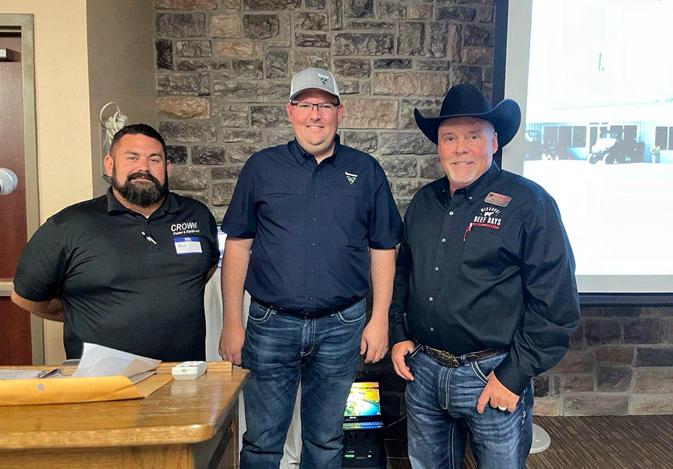
The unofficial start to Missouri Beef Days was the First Annual Fashion Show held on Mach 30. A fun time was had by all. We had several from Polk County Cattlemen’s Association in attendance. There was even a special model, our very own Logan Chaney. The styles will be in demand at the Boots and Bling Banquet and all the other events. Be sure to check out the local boutiques and get your outfits ready. Christy Whittaker is a step ahead by winning the 50/50 Raffle. She won an American Darling Leather Bag and $420! The other $420 that was raised will be used for incidental expenses incurred by the Polk County Beef Queen while representing us.
If you plan on joining in on the events at Missouri Beef Days, go online and buy your tickets now. It will be here before we know it and you don’t want to miss out. Check the schedule to see what your favorites might be. You might try something new and be surprised by what you can learn. We hope to see you there!
MAY 2023 58

Southwest Missouri Cattlemen
The Southwest Missouri Cattlemen’s Association (SWMCA) met on April 4, 2023, at the MU Southwest Research Center (SW Center). SW Center Director Jay Chism and Livestock Specialist Patrick Davis gave updates on their work through extension. Brian Worthington, agriculture field representative for U.S. Congressman Eric Burlison, gave insight regarding Waters of the United States and other bills currently being discussed in our nation’s capitol, and invited everyone to the Farm Bureau Ag Forum hosted at Missouri State University.
This month’s inspiration was found in Deuteronomy 11:15, and the invocation was provided by Briana Isakson. The SWMCA Grill Team and Flat Creek catered the meal. We are so fortunate that our grill team is willing to take care of preparing our meal’s centerpiece - without their efforts, we would not be able to enjoy steak as often as we do!
Prior to the evening’s main speakers, the Mt. Vernon FFA Chapter presented their Ag Issues topic, and graduate students from Missouri State University shared their research efforts as they relate to cattle production.
Joe Meggison with Axiota (Multi-Min 90) and Randy Schilling with Boehringer Ingelheim presented the evening’s program. Both individuals discussed the importance of preventative practices and their influence on animal health, production, and, ultimately, profitability.

SWMCA requests anyone who is not a current board member or officer to consider joining our leadership team as secretary.
We are excited to announce that both Crane and Pierce City FFA Chapters are this year’s recipients of the Ag Department Grant. Both schools will be awarded $2,500. Additionally, Chase Daniel and Donielle Brottlund will both receive a $1,000 scholarship towards their post-secondary education expenses. Congratulations!
Please note, the proposed Eldon Cole Heifer Program will not be implemented at the Show-Me Select Heifer Sale as it will conflict with an already existing Eldon Cole Endowment Fundraiser planned for that evening (the SWMCA Board was not aware at the time of our April meeting). On a side note, Robert Miller volunteered to enter an Eldon Cole heifer after our April meeting, and we want to thank him for his willingness to join this effort! Again, there will not be any Eldon Cole
heifers sold at the May Show-Me Select Heifer Sale. However, we hope to see you there - it’ll be a great night to purchase quality replacements and build the Eldon Cole Endowment!
Dr. Adam McGee presented a brief summary of the proposed Overnight Fall Farm Tour; there were 26 in attendance who expressed strong interest. At our May meeting, you can expect an itinerary and official registration.
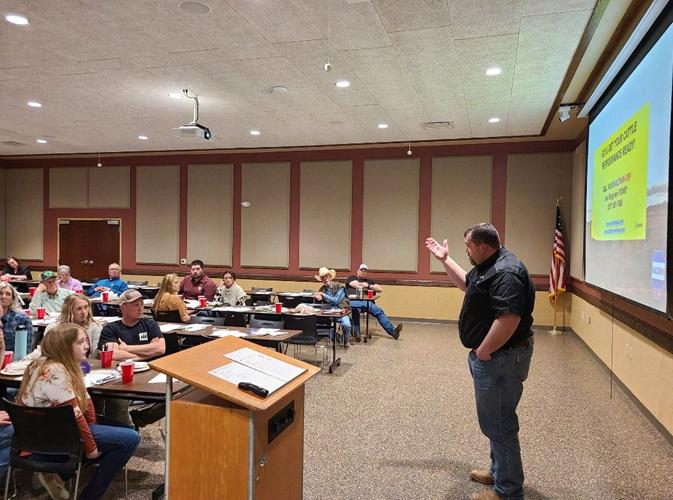
The Missouri Cattlemen’s Association Steak Fry is planned for Saturday, June 10. We hope you’re able to make the trip to Sedalia and enjoy the program!
All in all, we had a jam packed meeting in April. It was great to hear from agricultural youth of all ages, learn from industry professionals, and a spend an evening with like-minded individuals. Hopefully, we’ll cross paths at our final Cowboys at the Capitol function (April 26) prior to our May meeting. If not, here’s to tall grass, plentiful rain and warm sunshine! - Nathan Isakson, SWMCA President.
MAY 2023 60
Newton and McDonald County Cattlemen

The Newton and McDonald County Cattlemen’s meeting was held March 21, 2023, at the Newton County Fair Grounds. Approximately 125 members and guests enjoyed a wonderful steak dinner. Steak was grilled by our team of Nick Neece, Randy Drake, Ronnie Tosh and Alan Drake. Crowder College provided side dishes and students to serve. Homemade ice cream and other desserts were provided by the members. The meeting was called to order with the Pledge of Allegiance guided by Brian Hall, president. Mark Hall said the prayer. The minutes where provided and the Treasurer’s Report was read by John Hobbs, treasurer. A motion was made by Max Ruhle and seconded by Shelly Brock to approve the minutes. The motion passed unanimously.
While members were enjoying their meal, Pierce City FFA students from their environment impact team gave a presentation that they will be taking to state competition. Grace Garren then spoke to members about a trip she is taking to Washington, D.C. Jennifer Thogmartin gave a presentation on the new agriculture education building that the Neosho School District is hoping residents will vote to build in the April election and how it could impact the education of our future cattle producers.
Josh Wisdom from the Missouri Department of Conservation gave a presentation on black vultures and how to discourage them from damaging property and livestock. He offered several options of how to discourage them from invading your property. He also gave the website that will allow you to obtain a permit for shooting and displaying nuisance birds to frighten other black vultures. This permit can be obtained free

of charge by contacting the Missouri Farm Bureau. The phone number for that is (573) 893-1416. The permit will allow you to kill up to five birds annually, and you must reapply each year.
Finding that there was no other new business, the meeting was then adjuourned by unanimous vote.

MAY 2023 61
Jennifer Thogmartin
Josh Wisdom
South Central Cattlemen
The South Central Cattlemen met for their monthly meeting on Thursday, March 23, at the Extension Office in West Plains. Members dined on a BBQ dinner from Sniders that was provided by Simmons Bank. There were approximately 75 members present.

President Dan Corman opened the meeting welcoming all members and guests. He encouraged those that were not members to become members. He introduced the 2023-2024 Officers and Directors and Past President Janet Crow. Jenny Poor stepped in for Secretary Elizabeth Picking and read the minutes from the February meeting. Barry Slayton made a motion to approve the minutes; Blake Crow seconded the motion. Jenny then presented the Treasurer’s Report.
Dan then discussed the March 7 SCCA Executive Board Meeting with the group. He went over the upcoming meeting topics for the first half of the year. Some include:

• Weed Control and Forages
• Regulatory Changes to OTC Antibiotics
• Field Day at Corman Charolais
Dan also discussed the need for operating funds for SCCA. He presented the board recommendation to reinstate our local affiliate membership for local businesses with dues of $60/year. Wayne Nichols made a motion to approve the recommendation; Tom Roberts seconded the motion. Tom is to bring in past affiliate information that he has.
Various reports were presented. Dan spoke about the March 1 Cowboys at the Capitol. Dan, Blake Crow and Stan Smith attended. The topics discussed with our legislature included:
• Eminent Domain’s PSC committee needs a landowner/producer on the committee.
• The Farm and Ranch Viability Act.
• Expand the program to encourage more large animal veterinarians in underserved/rural areas.
Jenny Poor encouraged members to join MCW and discussed upcoming events they have. She also discussed MoBeef for MoKids and encouraged the members to donate a cull cow to the program.
A call for any upcoming cattle sales was made.
March 25 - Spreutels Farms will be selling 6 Red Angus bulls in Heber Springs, Arkansas
April 4 - New Day Genetics (Barry Slayton) will be selling 90 bulls and 60 bred heifers in Salem, Missouri. Auction will be on DV Auction
Janet Crow then introduced new members and guests at the meeting.
Dan introduced our meal sponsor, Simmons Bank. Cole Plafcan, senior vice president of ag lending, Clay Cannon, John Plummer, Steve Vines and Steve Hann all attended the meeting. Cole spoke about Simmons’ commitment to farmers and encouraged the group to reach out to any of them for any agricultural or other lending needs.
Marty Simpson of Simpson Estate and Elder Law in West Plains spoke about estate planning for farmers and ranchers. Marty discussed the differences between E\ estate planning and succession planning. He discussed beneficiary designations, capital gains taxes, estate taxes, and ways of probate avoidance. All in all, Marty had a lot of useful information for the group and can be reached at (417) 256-1968. John Plummer with Simmons Bank then gave out door prizes for the group, and the meeting was adjourned.
MAY 2023 62
Marty Simpson, owner of Simpson Estate and Elder Law.
April 22 - Stan Smith will be selling Black Angus bulls at the Heart of the Ozarks Black Angus Sale in West Plains, Missouri.
Cole Plafcan, senior vice president of ag lending with Simmons Bank
Lafayette County Cattlemen
Officers for the Lafayette County Cattlemen for 2023 were elected at the March 4 annual meeting. Darrell Neuner will serve as president; Chance Malott as vice president; Kathy Harris as secretary; and Sherie Neuner as treasurer. Don Schlesselman, past president completed the executive board. Board of Directors elected for 3-year terms were Hannah Copenhaver, Brian Wildschuetz and Thad Madsen. Bill Oelrich will fill the remaining two years of Chance Malott’s unexpired term. State Board members elected were Kathy Harris and Jeff Bergman. Retiring board member Marlene Edwards was recognized for her years of service.

Other business included the association’s annual donation to the Lafayette County 4-H/FFA Fair and the Lafayette County MU Extension office. Members voted to support both with $500 donation each.
Ethan Daehler of Lexington was awarded the Lafayette County Cattlemen of the Year for 2022. During his time as a board member, Ethan has taken an active part in meetings and has gone above and beyond in helping at cookouts and special events.Ethan has a Red Angus cowherd and is an avid collector/restorer of Allis Chalmers tractors and equipment.

Dr. Craig Payne, DVM, was the speaker for the March 28 educational series meeting at the Mayview Community Building. Dr. Payne addressed the new regulations regarding access to antibiotics for use in livestock. A question and answer period followed his presentation, which prompted a discussion regarding the need for more large animal veterinarians, not only in the local area, but the State of Missouri, as well.
A brief board meeting was held following the educational meeting to make plans for May is Beef Month and for a report from Scholarship Co-Chair Hannah Copenhaver.


For More Information Call…
David Patton Office Ross Patton Bill Patton
Visit
MAY 2023 63
Dr. Craig Payne, DVM from the University of Missouri discussed upcoming restrictions for antibiotics starting in June.
Officers were elected for the 2023 year at the LCCA annual meeting.
Ethan Daehler (left) receives the 2022 Lafayette County Cattleman of the Year award from 2021 recipient, Jeff Bergman.
573-422-3305
573-308-6655
573-308-6657 573-308-6658
Selling All classes of Cattle Wednesday • 10:00 a.m. Featuring ‘Star-Vac Program’ Cattle Weekly DVAuction Service for convenient online viewing & bidding Hwy 42 West • Vienna Missouri 65582 45 Miles South of Jefferson City
our website: www.scrsvienna.com or E-mail us: scrsvienna@gmail.com “Make South Central your Livestock Market”
Dallas County Cattlemen
Members of the Dallas County Cattlemen’s Association (DCCA) were versed about two important topics when raising cattle at the group’s April 11 meeting held at Prairie Grove School south of Buffalo. Dalton Ewing, territory sales manager at the Kent Nutrition Group, talked to the group about the importance of feeding mineral, as well as a good fly control program.
Ewing explained the wide variety of minerals that Kent Feeds has available to customers. He especially touted the company’s Performance 365 minerals. He stressed the importance of zinc as a key trace mineral as it is a fundamental building block for different parts of an animal’s body and aids in the production of high quality colostrum. Studies have shown a 15-20% increase in conception rates using his products.
Ewing also discussed how flies on cattle can impact not only the animals, but also have a negative effect for the producer. The horn fly pulls out the majority of blood from an animal with about 12 1/2 gallons of blood lost in a season. The horn fly is not only a vector for disease, but also can cause up to 20 pounds less at weaning, as well as cause cattle to run higher temperatures. Ewing talked about the many products Kent produces with Altosid IGR, which he recommends for pastures, as well as Clarify, which he prefers for a barn setting.
DCCA would like to thank Rodney Kropf and Kropf Feeds for sponsoring our delicious meal of smoked brisket and pulled pork. We would also like to thank the school for hosting us again and the ladies who helped prepare a great meal.
DCCA will be helping the Buffalo FFA Chapter with an all-day big event on May 2 at the Dallas County Fairgrounds. Nearly 700 students from D.A. Mallory
Elementary School will not only get a chance to experience a petting zoo, but learn all about agriculture and different species of livestock. DCCA will teach the children about the importance of eating beef. We will also sponsor a coloring contest and have drawings for beef gift certificates to be used by families at local grocery stores.
Bates County Cattleman
Tuesday, April 11, the Bates County Cattlemen held their April meeting in the Adrian Optimist Building with 23 Cattleman and CattleWomen in attendance. The meeting was sponsored by Mine Creek Feed of Pleasanton, Kansas (https://www.facebook.com/ MineCreekFeed). Owner Connor Heck gave an informative talk about the new feed company in the area, the different types of feed they are currently providing to consumers and discussed expansion that will happen in the future. He also took several questions from the group, including a discussion of how far they would be willing to travel to deliver, along with presenting 10% off vouchers for upcoming orders.

Next, we had another special guest in MCA’s own Courtney Collins who gave an informative talk on items that affect cattle producers that are in the works at the Capitol. She invited all of us to go to the Capitol for our session of Cowboys at the Capitol.
Some other important dates she reminded us of are the the Steak Fry on June 10, and Bates County’s day at the Beef House on August 14.
She also discussed membership, along with ways to get more wheels and cartridges for the goal of getting the scholarship money from Merck.
Our normal business meeting followed.
MAY 2023 64
Dalton Ewing, territory sales manager at the Kent Nutrition Group.
Pettis County Cattlemen
On February 21, 2023, President John Shipman called the Annual Pettis County Cattlemen’s Meeting to order. The meeting was held at the Our Savior Lutheran Church annex in Sedalia, Missouri, with about 50 attendees. A dinner featuring roast beef was served, and many of the great cooks in the county brought their best desserts.

The members heard from MCA President David Dick, National Beef Checkoff appointee Patty Wood, MBIC Executive Director Sydney Thummel and Senior Crop Agent Courtney Wolfe of Farmers Business Crop Insurance.
Many door prizes were given away by our youth emcees, Reagan and Rhett Gregory, and an auction was held to benefit the Pettis County Foundation Youth Scholarship. A moment of silence was observed for Susan Mergen, the wife of one of the original Foundation Founders, who recently passed away.

The officers and directors for the 2023 year were announced at the February 28, 2023, meeting of the
board. They are as follows: President Ted Williams; Vice President Alan Ream; Secretary John Shipman; Treasurer Jim Fairfax; and Regional Directors Anthony Schwartz, Cody Wood, Brian Sneed, Mike Carter, David Elliott, and Jason Sneed.
Robert Gregory was presented a plaque and gift certificate in appreciation of his 30+ years as treasurer for the PCCA. Robert is a long-time supporter of the Cattlemen and has served on both the county and state levels in many roles, including the original Missouri State Fair Beef House Leader.
Pettis County members cooked ribeye steaks, beefburgers and beef dogs for the FCS Customer Appreciation Day at the Sedalia branch. The customers were thrilled with the wonderful lunch.

Every Monday: Slaughter Cattle
1st Thursday Nite of Each Month: 6:00 p.m. Bred Cows and Breeding Bull Sale
Jack Harrison 573-999-7197 (owner)
John P Harrison 573-220-1482
Claude Niemeyer .............. 573-470-1017
Roger Temmen 573-680-4538
Justin Oberling 217-440-7724
Glenn Stegman ................. 573-619-8495
MAY 2023 65
Callaway Livestock Center, Inc. On I-70, 4 miles east of Kingdom City, MO on outer road 573-642-7486
12:00 p.m.
Selling All Classes of Cattle 12:30 p.m.
St. Clair County Cattlemen
St. Clair County Cattlemen’s Association met on Tuesday, April 11, at Farmhouse Kitchen in Appleton City with 38 members and guests present. Dennis Snavely with Suther’s Nutrition Management People spoke to the cattlemen about cattle health and the importance of mineral to any cowherd. As you graze your cattle, pasture nutrition changes and you need mineral to supplement what your cattle are not able to get out of the grass. Suther’s Nutrition Management can make a mineral blend to fit your cattle. Some cattlemen may think that mineral is too expense to feed, but on a cattle ranch, the cattle are your main investment that you expect to get a return on. Mineral cost $.10-.20 per day to feed, depending on the blend you choose. This is a relatively cheap investment for the return you will make. Dennis encouraged anyone with questions to please reach out to him or their company. Thank you, Farmhouse Kitchen, for the delicious meal and Appleton City Feed Service for sponsoring the meal tonight!
community or at state or national level events. People are watching, and you don’t want to do something that could jeopardize yourself or the organization.
Regional Vice President Warren Love spoke to the group about the good feedout program — “Top 100” Profitability Challenge — that is going on at the state level. It allows you to see exactly how much feed it takes to put a gain on your animal. He also encouraged people in the rural area to attend Cowboys at the Capitol and serve on committees as it helps keep the rural perspective in the inner cities.
Our next meeting is scheduled for June 13, 2023, at 7 p.m. and is sponsored by Stewart & Kiefer Real Estate.
Barton County Cattlemen
The Barton County Cattlemen met April 4 at 7 p.m., 2023, at the Thiebaud Meeting Room in Lamar.
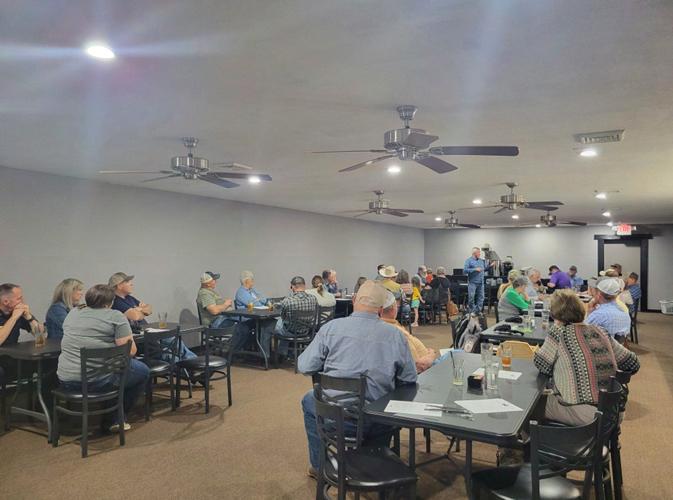
A brisket dinner furnished by Specialty Risk Insurance and prepared by Scott Nolting was enjoyed by all in attendance.
MoBeef for MoKids donation dates for next school year are set. Next school year dates are August 4 (three head), October 6 (three head), December 29 (three head), March (three head). Any person or business interested in donating, please see Weston Shelby or Lawanna Salmon so they can get it marked down. Monetary donations are being taken to help the cattlemen purchase cattle when no one has one ready to go at the scheduled time.
President Mike Nance explained that we have been awarded the Beef Promotion and Beef Education Grant. We purchased beef sticks with these grants and will be handing some out at May is Beef Month and the rest at Trunk or Treats.
State Board Member Josh Salmon spoke to the group on the importance of conducting yourself in a professional manner when you are out and about in the
Nathan Enyart and Clay Vaughn explained the risk protection they offer. Say you are holding calves back and you are planning on getting them to a certain weight, then you plan on selling them. Currently, cattle prices are high, but so are inputs, and there is some time before your cattle are ready to be sold. There have been times in the past when the market has suddenly dropped, and you are still paying for the high inputs, and the breakeven point now becomes a loss.
Specialty Risk Insurance offers insurance for the beef producer that will cover the ending price with coverage ranging from 70-100% of the expected price. The premium is partially federally subsidized, and this ranges from 35-55%, depending on the coverage level.
This insurance is available in all counties in all 50 states. Contact Nathan and Clay for details at (417) 359-5470.
MAY 2023 66

Dr. Dana Kayle Gillig
Dr. Dana Kayle Gillig, 49, of Sedalia, Missouri, passed away at St. Luke’s Hospital in Kansas City on Thursday, April 13, 2023. Visitation was Tuesday, April 18, 2023, at Royer Funeral Home in Grain Valley, Missouri. Funeral services were held on Wednesday, April 19, 2023 at the funeral home. Interment followed at Valley Memorial Gardens in Grain Valley. In lieu of flowers, memorials can be made to Pettis County 4-H Foundation or International Harvester Missouri Chapter 1.
Dana was born August 23, 1973 in Kansas City to Jean (Koelling) Gillig and Ron Gillig. Dana graduated from Grain Valley High School in 1991. Early on she had a love for animals and spent many hours riding along on calls with Odessa veterinarian, Dr. Jim Peddicord, during high school. Dana attended Northeast Missouri State University (Truman State) for three years and then went to the University of Missouri College of Veterinary Medicine and obtained her Doctor of Veterinary Medicine Degree.
Dr. Gillig was the first female veterinarian to win Missouri Veterinary Medical Association’s coveted Veterinarian of the Year Award in 2014. Dr. Gillig was an active member of MVMA, serving in various positions throughout her career, including MVMA President in 2011. In addition, Dr. Gillig was a past president of the West Central VMA District, member of AVMA, AABP, Society of Theriogenolgy, and the Academy of Rural Veterinarians. Dr. Gillig also served as the Missouri State Fair Vet for a number of years.
Dana owned and practiced veterinary medicine at Sedalia Veterinary Center, a rural mixed-animal practice in Sedalia. Dr. Dana’s passion and love for being a large animal vet, especially working with the bovine, was her special calling. Friends and clients remember her as being one of the toughest vets around. What may have started with clients saying, “I don’t want a woman veterinarian,” quickly became “I want no
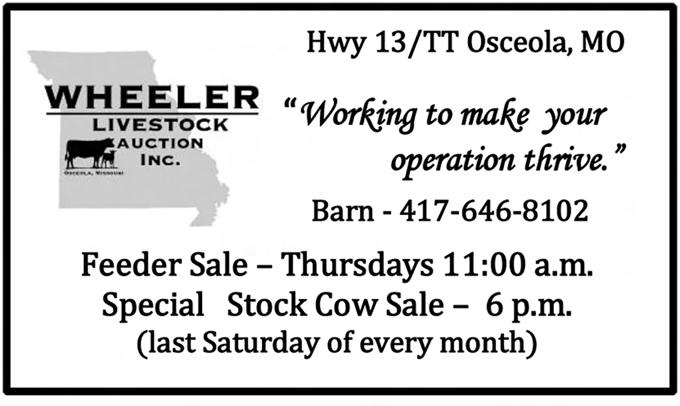
one but Dana.” Later in her career, she began teaching agriculture classes at State Fair Community College in Sedalia. Dana was an active member of the First United Methodist Church serving as chairman of the Pastor Parish Committee and a member of the Praise Team playing djembe, timpani and accessory percussion.
Dana fought a long battle with necrotizing pancreatitis. Family, friends, and brothers and sisters in Christ sent up millions of prayers on her behalf – prayers for a miracle. The miracle was the extra years of life that the prayers granted. She never gave up on her faith and loved God above all else. Dana was a spiritual inspiration who helped to bring those in need to a closer relationship with God.
She is survived by her parents, Ron and Jean, Odessa; brother Jarrod and his wife Jami Gillig and their children, Dakota and Kinsley, Blue Rapids, Kansas. Aunt Donna (as she was called by Dakota and Kinsley – there’s a story with that) was their biggest cheerleader and the light of her life.
Dana was proceeded in death by her grandparents Roy and Geneva Koelling and Armin and Ann Gillig.
For many years Dana was a Veterinary Science project leader for the Pettis County and Jackson County 4-H. Dana also loved helping her friend Greg restore his antique IH tractors.
A special “Thank You” to everyone who sent cards, gifts, prayers and amazing support to Dana during her many years of struggle. We are forever grateful. Love, Ron, Jean, Jarrod, Jami, Dakota and Kinsley.
Vernon Clare Elliott Jr.
Vernon Clare Elliott Jr. 81, passed away Wednesday March 29, 2023 in Harrisonville, Missouri. He was born in Chanute, Kansas, on August 28, 1941, to Vernon Sr. and Celia (Gribbens) Elliott. Vern graduated from NE High School in Kansas City, joined the United States Navy in November 1960 and served until May of 1965. On August 7, 1964, he married Luanne (Snow), and they shared 58 wonderful years together. They moved from Oak Grove to Holden in August of 1967 and raised their son, Carl, on the farm.
Vern was a rural mail carrier until his retirement in September of 2001. He was a farmer and long time member of the Missouri Cattleman’s Association. He was instrumental in organizing what is now known as the Johnson County Fire Protection District #2. From 1968 till his retirement on November 11, 2012 he was a staple of the fire department.
MAY 2023 68
Vern also had a love of antique engines and was a lifetime member of the CAFMCO-Chilhowee Antique Farm Machinery Collectors Organization. Luanne said he just liked to hear the old engines run. Swap meets were another pastime he enjoyed. He loved finding things he “needed”. Vern was blessed with two grandsons that were his pride and joy. He was an amazing husband, father, grandpa and friend. Vern will be greatly missed by everyone who knew him.
Vern is survived by his wife Luanne Elliott of the home; son Carl Vernon Elliott and wife Erin of Holden; 2 grandsons Landen and Bryson of Holden. He was preceded in death by his parents and 2 halfsisters Betty Wayne and Peggy O’Neil.
The family had a visitation on Sunday April 2, 2023 at 5-7pm at Campbell-Cast Funeral Home in Holden, Missouri. A funeral service was held Monday April 3, 2023 at 10 am at the funeral home with Pastor Michael Wakeman officiating. Pallbearers included Larry Atkins, Travis Crain, Jeremy Anstine, Bill Snow, Allen McClure and Chris Eagleson. Honorary pallbearers were his grandsons Landen and Bryson. Memorial contributions may be made to CAFMCO, PO Box 17, Chilhowee, MO 64733. Online condolences may be left at www. castfuneralhome.com.
Elizabeth Barnitz
A celebration of life for Elizabeth Barnitz, of Lake Spring, was held on April 22, 2023, at James & Gahr Mortuary Chapel in Salem.
Mrs. Barnitz died March 20, 2023, at the age of 86 years.
Survivors include her husband, George Alan Barnitz, Lake Spring; children, Laura Barnitz and Abi D’sa, Silver Spring, Maryland; Ellen Villeme and husband, Fred, Rolla; Frank Barnitz and wife, Lisa, Lake Spring; and Sara Earl and husband, Pat, Rolla; grandchildren, Ava and Dya D’sa; Anni Lauri, Shaila and Forrest Villeme; Cami Chapman and husband, Justin; Kenadee Barnitz and fiancé, Traves Merrick; Amaura Fry; Alison Earl and fiancé, Tyler Dvorak; Nathan Earl; greatgrandchildren, Presley Chapman, Hadlee Dvorak and Denver Merrick.
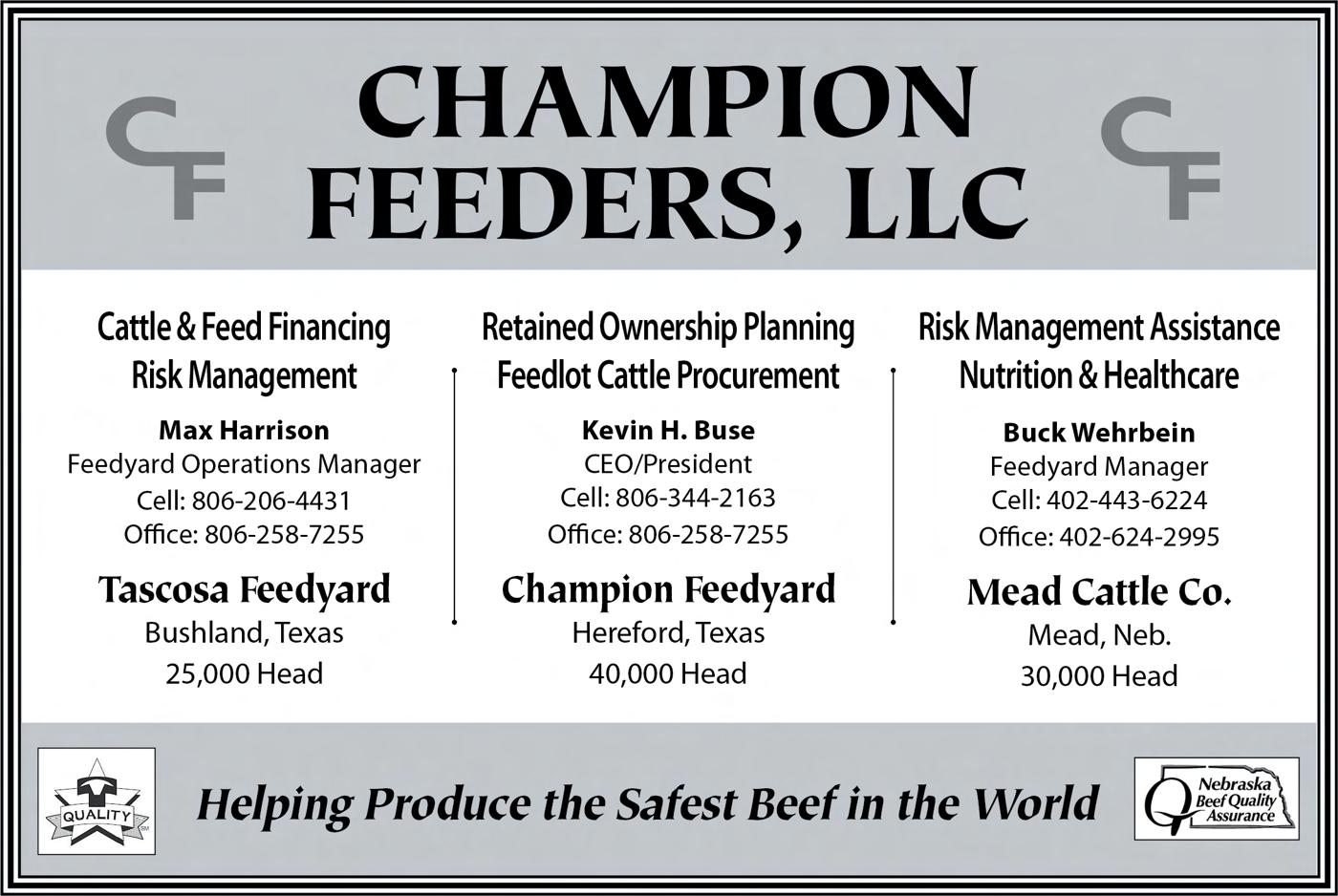
Memorials may be made in lieu of flowers to the Lake Spring Cemetery. Cards may be obtained at James & Gahr Mortuary.
Online condolences may be entered at www. jamesgahrmortuary.com.
MAY 2023 69
Economic Impact Study Shows Livestock Auctions Importance for Rural Vitality
Source: LMA
OVERLAND PARK, KANSAS (April 13, 2023) - A 2023 economic impact study, which updated a study from 2017, found that livestock auction markets continue to be important for the growth and vitality of rural communities. The study of an average, fixedfacility livestock auction market revealed that the market provides approximately $2 million in total value-added dollars to its local community. This result is up from $1 million identified in the 2017 Livestock Marketing Association (LMA) Economic Impact Report.
The case livestock auction market, located in a rural Missouri town with a population of less than 5,000, sells all classes of cattle in a weekly sale. The auction market was selected as a representative example of LMA member-livestock auctions based on type of operation, gross sales of livestock, rural location of market and population of city. LMA represents 85% of the livestock auction markets in the United States, with cattle being the largest per-head species sold through livestock

auction markets annually (32 million head, per 2020 USDA P&S Annual Report data).
Key findings also revealed that the market studied provides 17 jobs, generating $888,000 in labor income to the community’s economy. Additionally, the market contributes $447,000 in local taxes and $108,000 in federal taxes. Of the total value-added number, contributions were also made by the on-site café, which further provides labor income, state, local and federal taxes.
“Livestock auction markets today remain critical to helping our rural communities continue to thrive,” said Kristen Parman, LMA Vice President of Membership Services. They generate a competitive sale environment which results in cash for local livestock producers. That cash equals dollars spent in town and investments back into their businesses and operations.”
In collaboration with LMA, the study was completed by Decision Innovation Solutions in Urbandale, Iowa.
About the Livestock Marketing Association
The Livestock Marketing Association (LMA), headquartered in Overland Park, Kansas, is North America’s leading, national trade association dedicated to serving its members in the open and competitive auction method of marketing livestock. Founded in 1947, LMA has more than 800 member businesses across the U.S. and Canada and remains invested in both the livestock and livestock marketing industries through support, representation and communication efforts. For more information, visit www. LMAWeb.com.
MAY 2023 70
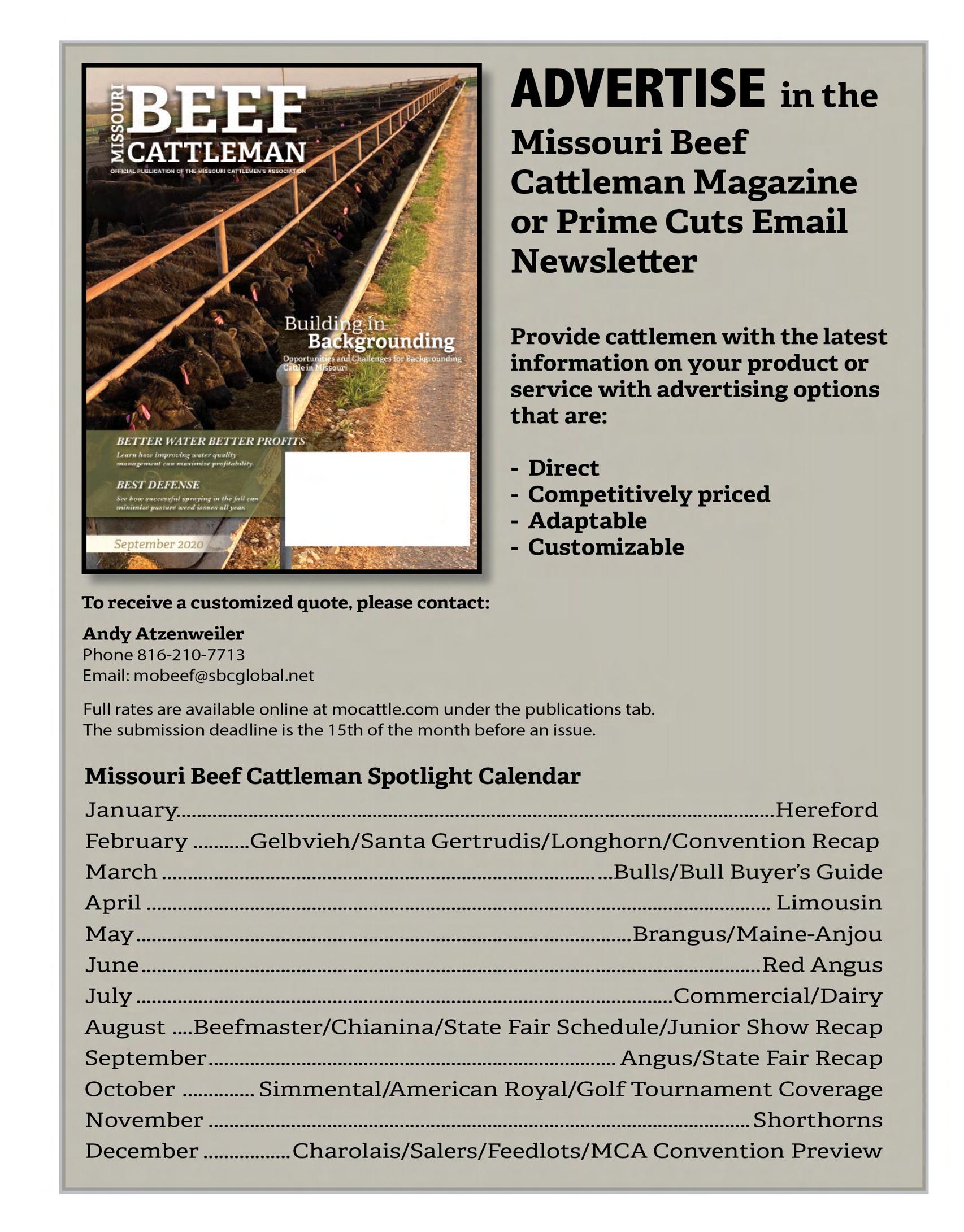
Avoid Applying Nitrogen to Tall Fescue Pastures in Spring
Source: University of Missouri Extension
COLUMBIA, MISSOURI – Livestock producers can learn how to reduce toxins that damage performance and profits during the March 23 Alliance for Grassland Renewal workshop in Mount Vernon, Missouri.

University of Missouri Extension state forage specialist Craig Roberts says ergot alkaloids in Kentucky 31 tall fescue begin to increase about mid-April in Missouri. Tall fescue is the state’s main cool-season grass.
Fescue toxins bring a host of bad side effects. In extreme cases, toxins cause fescue foot in cattle. More subtle losses are lower gains, less milk, poor calving, low weaning weight and other ills.
Adding spring nitrogen to tall fescue worsens problems inherent with ergovaline, the fungus-produced compound responsible for poor animal performance,
Buffalo Livestock Market
1 mile west on Hwy 32 • Buffalo, MO 65622
Barn: 417-345-8122
Sale Every Saturday 12:00 Noon
• Selling 1200 to 1700 head Farm Fresh Cattle weekly
• Special Stock Cow and Bull Sale
3rd Tuesday night of each month at 6:30 p.m.
• Pre-Vac Feeder Calf Sales 2nd Saturday of every month in conjunction with Regular Sale (Pfizer Pre-Vac, BLM BPre-Vac, Bayer Program, Mo Quality Assurance. LMA-Vac and MFA Health Track)
Order Buying Service Available
Owners… Lyle Caselman Leon Caselman
417-345-7876 H 417-345-4514 H
417-533-2944 cell 417-588-6185 cell
Roberts said. “With added nitrogen comes more toxin,” he noted. “Effectively, the nitrogen aids both plant and fungus growth.”
Most tall fescue pastures grow more than most cattle can use in spring. Many forage experts, including Roberts, recommend low- to no-nitrogen fertilization during spring. Instead, save your fertilizer dollars for fall.
Fescue has two surges of growth – spring and fall. About two-thirds of the annual forage growth comes in the spring. A large application of nitrogen in spring causes grass to crowd out the legumes. If left unfertilized, legumes fix free nitrogen that is shared with nearby grass.
Producers also can reduce risks by exercising patience when turning cattle out onto spring pastures. After a long winter of feeding hay, producers might be anxious to turn cattle out onto fescue pastures. Instead, wait until fescue grows to 3-8 inches before turning cattle out, said Roberts.
And don’t let cows graze pastures too short, he said. Ergot alkaloid levels are most toxic in the bottom 2 inches of the plant.
Sometimes it pays to clip toxic tall fescue pastures before seedheads emerge, added Roberts. “Seedheads contain high levels of the toxin. Further, waiting until after heading results in low nutritional quality. It’s a double whammy, and livestock performance will be dismal.”
Seeding novel-endophyte fescue varieties that have a nontoxic fungus simplifies nitrogen spreading decisions, Roberts said. Replacing toxic-fescue pasture proves a cure for many problems caused by grazing K-31 fescue.
MAY 2023 72
Nationally recognized forage experts, including Roberts, and local producers will speak at the March 23 workshop in Mount Vernon at the MU Southwest Center.
Topics include symptoms and causes of fescue toxicosis; economics; establishment and first-year management; seed and endophyte training; transitioning from toxic fescue; products; and incentives and cost share. Find details and registration at TallFescueMo23.eventbrite. com.
MU Extension veterinary toxicologist Tim Evans said fescue toxicosis is one of the biggest challenges for cattle producers.
Test tall fescue pastures for endophyte infection and ergot alkaloid content during early spring, said Evans. Endophytes remain dormant through winter then break dormancy when fescue begins spring green-up.
Evans gave symptoms of ergot poisoning:
Lameness
Hair loss and reddening around tops of hooves
Sloughing of hooves or parts of limbs
Losing tail switches
Extreme heat stress

Rapid breathing/panting
Spending more time in ponds
Possible staggering
Occasional seizures
“Ergotism is like fescue toxicosis on steroids,” Evans said. It is not nearly as dependent on ambient temperature. Clinical signs of hoof and tail switch sloughing during late spring and summer are generally indicative of ergot, he says.
MU’s Veterinary Medical Diagnostic Laboratory tests for ergot poisoning and other toxins. Contact Evans at evanst@missouri.edu or visit vmdl.missouri.edu/ toxicology.
For more information, see “Fescue Toxicosis/Ergot Alkaloid Exposure Updates” at https://vmdl.missouri. edu/under-the-scope-fall-2020/fescue-toxicosis-ergotalkaloid-exposure-updates.
MAY 2023 73
Longhorned Tick Found in 3 Areas of Missouri
Source: University of Missouri Extension

COLUMBIA, MISSOURI. – University of Missouri researchers are tracking the invasive longhorned tick, which causes weight loss, lost pregnancies and even death in cattle.
Researchers from the MU College of Veterinary Medicine found the tick on a Linn County pasture in August 2022. The finding marks the northernmost appearance of the tick in Missouri. It also appeared in June 2021 near Springfield.
Found in 17 states since 2017, the longhorned tick is a significant concern for cattle producers, says Rosalie Ierardi, an anatomic pathologist at the MU Veterinary Medical Diagnostic Laboratory. Hundreds of the ticks can attach to a single animal, causing irritation and significant blood loss.
Kingsville Livestock Auction
Kingsville, Missouri Hwy. 58 • 45 Miles SE of Kansas City, MO
• 11:00 a.m.
For information call Rick, Jeremy, or Jared Anstine 816-597-3331 Visit our website kingsvillelivestock.com or E-mail us at: anstineauction@gmail.com

Ierardi says the tick can spread quickly. Females produce up to 2,000 eggs at a time. Since females can reproduce without mating with males, a single female can introduce a population of ticks into a new area.
The biggest reason veterinarians are concerned about this tick is that it transmits a parasite of cattle, Theileria orientalis Ikeda, which destroys red blood cells. Symptoms include jaundice, weakness and spontaneous abortions. The symptoms closely resemble those of bovine anaplasmosis, which is widespread in Missouri. A blood test is needed to tell the two diseases apart.
“Currently, there is no approved treatment for Theileria orientalis Ikeda,” says Ierardi. “Management typically focuses on reducing tick numbers and minimizing the impact of stress and other health issues that may affect a cow’s ability to mount a strong immune response.”

Producers can reduce risk by keeping cattle away from wooded areas and other habitats where ticks live, and clearing weeds and brush regularly. Consider inspecting cattle for ticks during handling events, says Ierardi. Livestock markets may provide opportunities for spread, so checking and/or treating new introductions is especially important. For specific herd health advice, consult a veterinarian.
Native to Korea, China, Japan and eastern Russia, the longhorned tick has been well-established as an invasive species in Australia and New Zealand since the 1950s.
The longhorned tick will continue to spread within North America in the coming years, leading to increased transmission diseases to cattle and possibly also to humans, according to Ierardi’s Ph.D. adviser, Ram Raghavan.
The







MAY 2023 74
Life.
Living the Ritchie
choice of what to cut back on is part of living a busy life.
fresh water for
animals,
Zeitlow Distributing Company 11025 Oo Hwy., Boonville, MO 65233 • mosales@zeitlow.com 800-530-5158 OmniFount 2 e.g. b. save MONEY c. save WATER d. a. Cuts MADEINsince1921 AmericA MADEINsince1921 AmericA MADEINsince1921 AmericA MADEINsince1921 AmericA
Provide
your
and have more for the other things.
Special Cow & Bull Sale in Conjunction
with Show-Me-Select Bred Heifer Sale Saturday, May 20
Cattle
Sale Every Tuesday 10:30 a.m.
Raghavan, an MU professor in the College of Veterinary Medicine and the School of Health Professions, has tracked the spread of ticks in the U.S. for more than 15 years. He predicted which areas of the U.S. would be suitable for establishment of the invasive longhorned tick in a 2019 study. This has been supported by real-world data over the last several years.
Like other ticks, the longhorned tick can easily travel unnoticed on livestock, humans and pets. Hosts include cattle, deer, dogs, humans, raccoons, opossums and other domestic and wild animals.
Although the longhorned tick transmits several human diseases in the regions where it originated, there is no evidence at this time that they transmit any human diseases in the United States, says Ierardi. Laboratory studies show that the tick can transmit Rocky Mountain spotted fever; researchers are studying the tick closely to learn more about how to manage this potential risk.
Strategies to avoid being bitten by the longhorned tick are the same as those for other ticks. Learn more from the U.S. Centers for Disease Control at www.cdc.gov/ ticks. If you think you may have found an invasive tick, contact your local veterinarian, extension specialist or health department for assistance to have the tick identified.
For more information
MU Extension publications (free download):
“Ticks and Tick-borne Diseases,” https://extension. missouri.edu/ipm1032

“Control of Anaplasmosis in Missouri,” https:// extension.missouri.edu/g7705
Information about the longhorned tick from the USDA Animal and Plant Health Inspection Service: https:// www.aphis.usda.gov/aphis/ourfocus/animalhealth/ animal-disease-information/cattle-disease-information/ cattle-vector-borne-diseases
a call for your next trailer 800-897-9840

www.Jimsmotors.com Commodity Trades Welcome

MAY 2023 75
Scott Cape, Owner of Jim’s Motors in Cuba, Missouri. All I have ever done is sell and trade trailers. Give me

Look at Fescue Seed Labels for Best Results
COLUMBIA, MISSOURI. – George Washington knew the value of a good seed: “Bad seed is a robbery of the worst kind,” the founding father wrote, “for your pocket-book not only suffers by it, but your preparations are lost and a season passes away unimproved.”
University of Missouri Extension livestock specialist Gene Schmitz agrees, especially when it comes to novelendophyte fescue seed.
“Look at the label when buying fescue seed,” he says. The right fescue seed makes the difference in livestock performance and stand persistence. The wrong seed uproots profits.
Schmitz was a speaker at 2023 Alliance for Grassland Renewal workshops across the Fescue Belt. Now in their 11th year, the multistate workshops promote conversion to novel-endophyte fescue that does not contain the toxins found in Kentucky 31, the nation’s most-used forage.
Sometimes, farmers go to the local feed store with good intentions to buy novel-endophyte fescue seed, he says. Unfortunately, they may haul away a load of endophytefree seed. Know what you are buying before you invest. The names are somewhat similar, but they are worlds apart.
There are three types of tall fescue: 1. Those containing toxin-producing endophytes that cause toxicosis; 2. Endophyte-free fescue, which contains no toxins but does not persist; and 3. Novel-endophyte fescue that has no toxins and provides a persistent stand.
Kentucky 31 or K-31 tall fescue contains a fungus that produces toxins that impair animal health. The endophyte fungus is invisible to the naked eye. Only laboratory testing can detect it. It results in a $1 billion loss annually to the cattle industry.
Symptoms of fescue toxicosis include narrowing of the blood vessels, fescue foot, poor thermoregulation and fat necrosis. Less visible effects include low feed intake resulting in poor weight gain, low birth and weaning weights of calves, low breeding rates, birthing problems and poor milk production.
Novel tall fescue seed, promoted by the Alliance for Grassland Renewal, prevents toxicosis. It produces plants infected with a harmless endophyte fungus that the plant needs to establish and keep a strong stand, but the fungus does not produce toxins. It is more expensive than other types, but it will reward herd owners with healthier livestock and long-lasting pastures, if managed correctly.

When buying tall fescue seed, look for the “AllianceApproved” label, says Schmitz. Approved seed contains at least 70% viable endophyte and no more than 5% of off-type endophytes. Labels give “sell by” and “plant by” dates. This is to help ensure a viable, non-toxinproducing endophyte is present in the seed at planting.
Buy seed early to avoid disappointment, says Schmitz. Many dealers do not stock large quantities. Work with seed suppliers to make sure they will have novel fescue seed supplies at planting time.
There is a small window between harvest of novelendophyte seed and its availability for sale. Harvest does not occur until July of the establishment year. After harvest, seed is sampled and submitted for testing under the quality-control standards of the Alliance for Grassland Renewal. It must be stored in a cool, dry place until planting in early autumn.
The Alliance for Grassland Renewal quality-assurance label will always be present on proven novel-endophyte fescue seed, Schmitz said.
Find more information in the article “Comparison of Commercially Available Novel-Endophyte Tall Fescue Forage Varieties” at www.grasslandrenewal.org/ resources-and-links.
MAY 2023 77
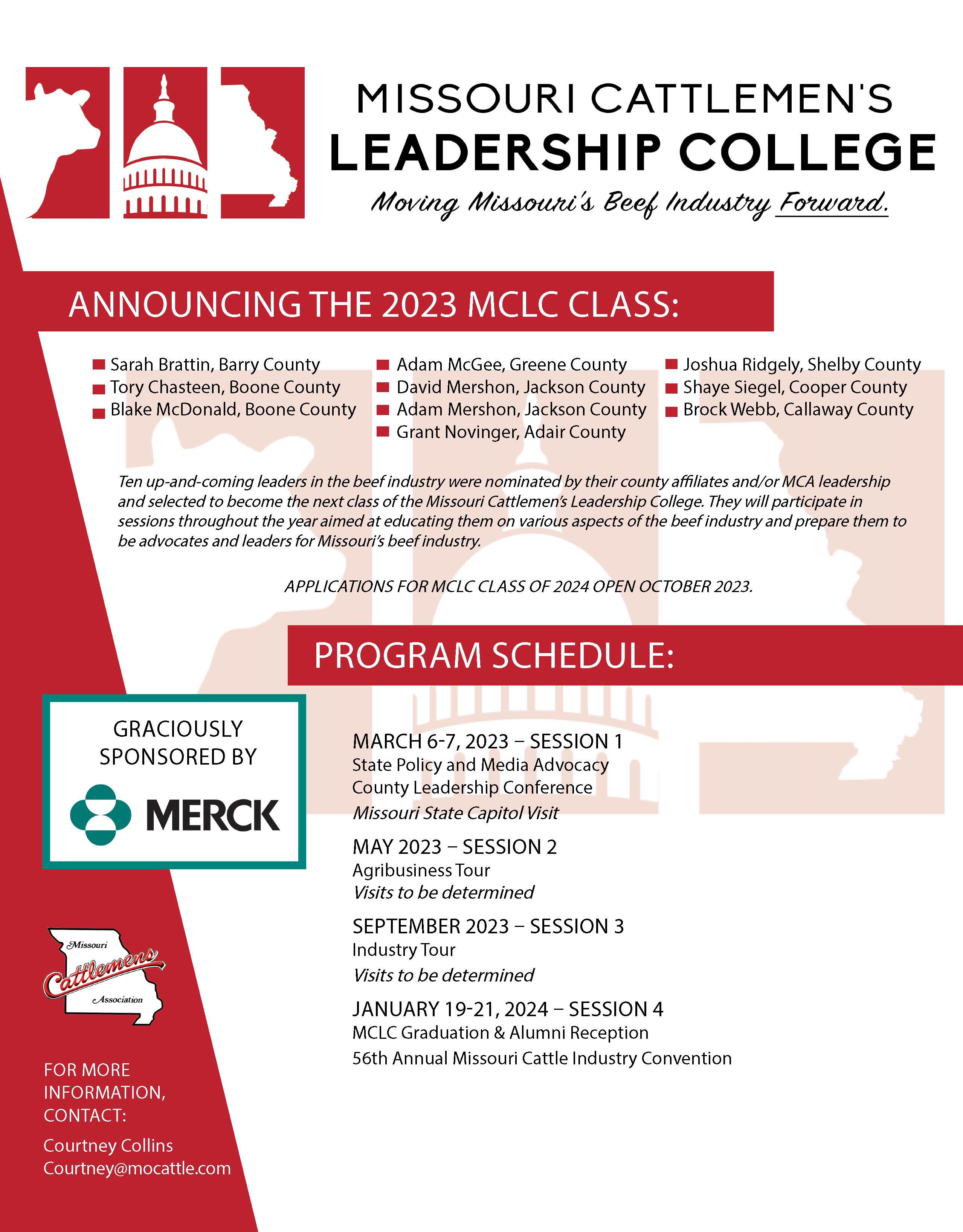

Suprised - Really Suprised!
It’s hard to surprise us. With nearly 45 years of combined experience within the Capitol halls, we thought we had seen and heard it all. From outrageous political speeches to questionable personal acts, we’ve been there and done that. Until now.
The past few months have proven to be unlike any other in our careers. Between misinformation, personal attacks and political chaos, we find ourselves in new territory. To say we are surprised is an understatement.
The controversy surrounds a four-letter word, and not one we’ve used to my mother’s chagrin. mRNA is the word that completely altered our lives and session. What began as a typical year with MCA priorities focusing on beginning farmers and property rights has morphed into guerilla warfare over cattle vaccines and industry health.
Messenger RNA, or mRNA, is a single-stranded RNA that is used to carry protein information within a cell. It instructs cells to make specific proteins from within one’s body to help prevent infections and prevent diseases. While I always loved biology and chemistry, I’m a firm believer in knowing what you know and knowing what you don’t know. Unlike the keyboard tyrants with whom we now are far more familiar than we ever hoped to be, I will leave the science to the scientists.
Why the biology lesson? Eureka’s State Representative Holly Jones filed HB 1169 which would impose new and extreme labeling requirements on Missouri products, including food, pharmaceuticals, and cosmetics. This legislation would increase food prices and create opportunities for harassment and lawsuits targeting Missouri’s farm and ranch families.
This bill never should have been referred to or considered in a public hearing. It was and immediately precipitated an absolute storm of outrage. MCA became enemy number one. Proponents were tricked into believing that Missouri’s cattle producers are purposely injecting livestock with vaccines to alter a person’s DNA. While we understand the absurdity of this notion, fear and misinformation were rampant within the Capitol halls and throughout social media.
To put it simply, we are under attack. We are surprised to see such an implausible idea gain such traction. It took hold and commandeered our lives for the past month. We are surprised at the public outrage propagated by a fearmonger. We are surprised at the lengths keyboard warriors will go to spread hate and falsehoods.
Yet, we also were surprised at the strength shown by our supporters on the House Emerging Issues Committee. Day in and day out, committee members were targeted with emails, calls, and tweets. Like us, the flurry of activity overtook their lives and mandated time that could have been dedicated to more productive business.
Most impressively, many of our champions are new to the legislature. They faced fury we’ve not before seen. They stood strong and didn’t waver. They were bullied, threatened and harassed. They showed leadership beyond their legislative years and experience.
We were able to defeat this dangerous bill in committee due to Representatives Dane Diehl (R), Ashley Aune (D), Jeff Farnan (R), Sherri Gallick (R), Mike Haffner (R), Dave Hinman (R), Josh Hurlbert (R), Jamie Johnson (D), Doug Mann (D) and David Tyson Smith (D). This group of bipartisan legislators stood firmly in the gap when we needed them the most. We cannot thank them enough!
On to the next crazy fight, Nancy and Cooper

Grazing “300 Days” Conference
Tuesday, June 6, 2023
8:30 a.m. – 2:30 p.m. UCM Prussing Farm
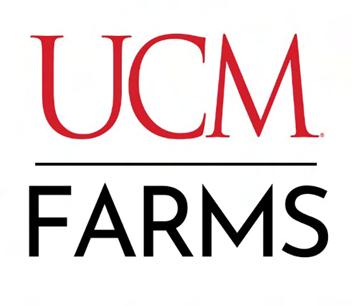
454 E. Division Road
Warrensburg, MO
Keynote Speaker:
Dr. Shane Gadberry, University of Arkansas ............ “300 Days of Grazing System”
Morning Session Speakers:
Dr. Mary Drewnoski, University of Nebraska ............ “Grazing Cover Crops”
Dr. Harley Naumann, University of Missouri ............. “Warm Season Grass Management”
Mr. David Boatright, Boatright Farms ........................ “Multi Species Grazing”
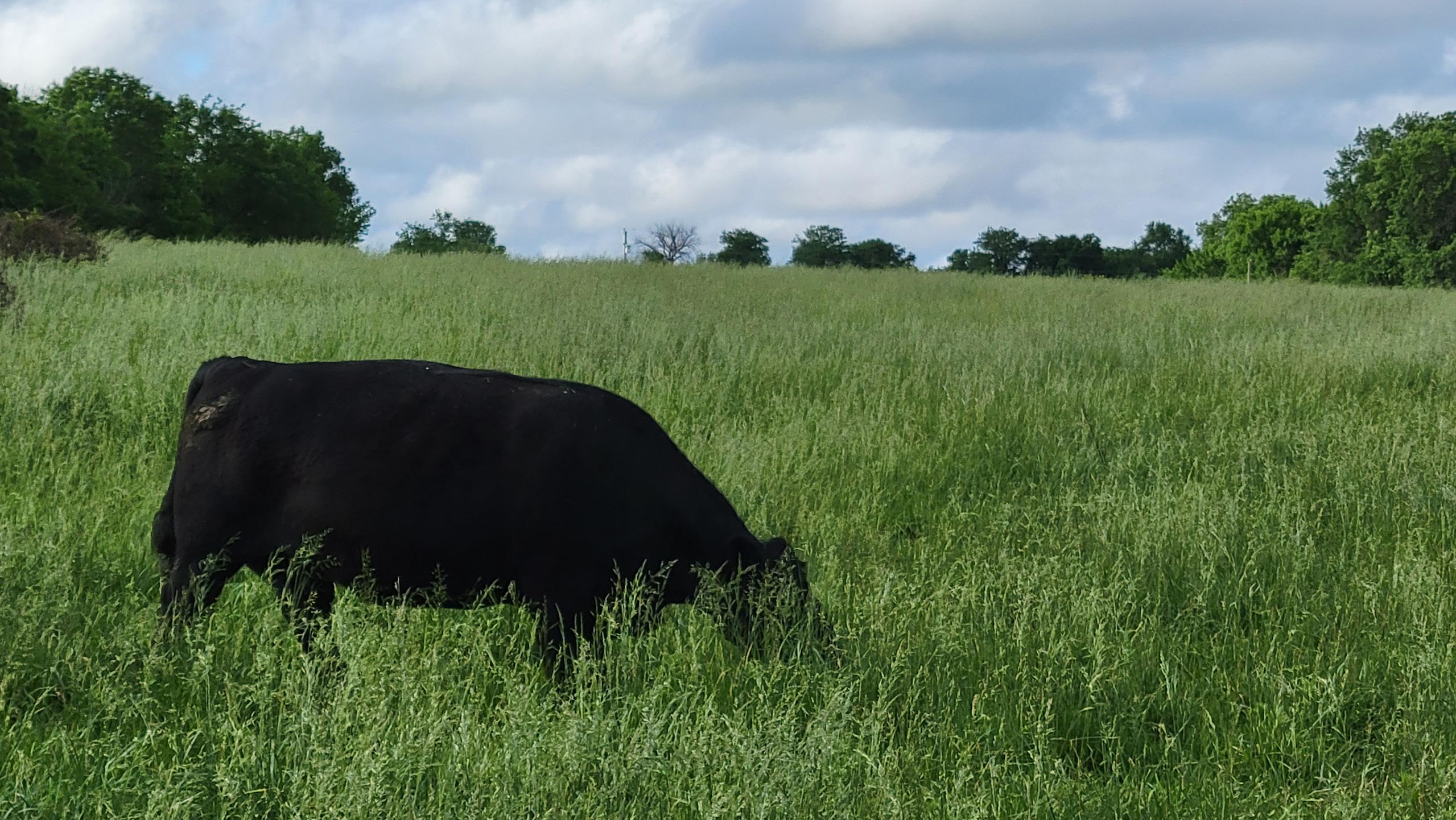
Registration Fee: ......................................................... $25.00 per person
Register by May, 31, 2023 at:
Cass County Extension Office ................................... 816-380-8460 or cassco@missouri.edu
Pettis County Extension Office .................................. 660-827-0591 or pettisco@missouri.edu

MAY 2023 81
Project funded through USDA-NRCS grant, MU Project 00070702 An equal opportunity/access/affirmative action/pro-disabled and veteran employer





MAY 2023 86
SALE REPORTS
Sydenstricker
New
MAY 2023 87
Gilbert Cattle Co. 2.18.23 • Oldfield, MO 27 Total Registered Bulls Avg. $5,018.00 5 Open Heifers Avg. $2,620.00 5 Total Registered Females Avg. $2,620.00 32 Reported Sale Total $148,600.00 Flickerwood Angus 3.11.23 • Jackson, MO 28 Total Registered Bulls.......................... Avg. $4,407.00 29 Fall Pairs .............................................. Avg. $3,834.00 29 Total Registered Females..................... Avg. $3,834.00 1 Commercial Pairs .................................. Avg. $3,500.00 57 Reported Sale Total $234,600.00 8 Story Farms 5th Annual Production Sale 3.25.23 • Gallatin, MO 9 Fall Yearling Bulls Avg. $4,306.00 27 2/3 Spring Yearling Bulls Avg. $3,371.00 36 2/3 Bulls Avg. $3,601.00 10 Open Heifers ....................................... Avg. $2,475.00 Total Sale Gross: .......................................... $156,750.00 Sandhill Farms Polled Hereford Production Sale 3.25.23 • Haviland, KS 126 bulls/$8,055; 20 registered females Avg. $9,450.00 60 commercial Hereford open heifers Avg. $2,000.00 45 commercial black baldy open heifers Avg. $1,938.00 5 commercial red baldy open heifers Avg. $2,050.00 Oleen Brothers Annual Production Sale 3.27.23• Dwight, KS 52 Horned Hereford bulls ........................ Avg. $4,260.00 53 Angus bulls .......................................... Avg. $6,470.00 96 commercial pairs Avg. $3,428.00 101 commercial fall bred heifers Avg. $2,233.00 28 yearling colts Avg. $2,336.00 2 riders Avg. $11,000.00 The Gathering At Shoal Creek Sale 4.1.23 • Excellsior Springs, MO 10 Open Show Heifer Lots ...................... Avg. $4,885.00 10 Cow/Calf Pair Lots .............................. Avg. $4,055.00 15 Bred Females ....................................... Avg. $3,417.00 11 Herd Bulls & Prospects ....................... Avg. $4,123.00
Angus Ranch 44th Annual Spring Production Sale 4.1.23 • Ashland, KS 374 bulls Avg. $9,501.00 100 donor heifers Avg. $9,853.00 156 bred heifers Avg. $5,593.00 86 bred cows Avg. $5,706.00 17 3N1 pairs Avg. $7,912.00 347 commercial bred females Avg. $2,965.00 1 horse .................................................... Avg. $26,000.00
Gardiner
Genetics
Annual Spring Influence Sale 4.11.23 • New Cambria, MO 75 Registered Bulls Avg. $3,591.00 4 Registered Spring Pairs Avg. $3,050.00 56 Commercial Spring Pairs Avg. $3,079.00
18th
Day
Sale 4.15.23 • Salem, MO 51 Black SimAngus Bulls ......................... Avg. $4,813.00 14 Red SimAngus Bulls ............................ Avg. $4,571.00 16 Purebred Simmental Bulls .................. Avg. $4,900.00 6 Registered Angus Bulls .......................... Avg. $4,375.00 87 Total Bulls Avg. $4,760.00 59 Commercial Bred Heifers Avg. $2,481.00
Cattle Co. Flint Hills Spring Classic 4.21.23 • Paxico, KS 70 Charolais Bulls Avg. $5,518.00 Not Included in Above Averages: 92 Beefmaster Bulls .................................. Avg. $6,036.00 20 Beefmaster Females ............................. Avg. $9,550.00 Sale Gross .................................................. $1,132,500.00
Camp Ranch Sale 4.21.23 • Lost Springs, KS 70 bulls Avg. $5,500.00 63 heifers Avg. $3,600.00
Beef Genetics Spring Bull
NextGen
Cow
SALE CALENDAR
May 1 Gardiner Angus Meating Demand Bull Sale, Ashland, KS
May 6 Hear tland Highland 12th Annual Auction, Springfield, MO
May 5 Sout heast Missouri Show-Me-Select Sale, Fruitland, MO
May 6-13 Missour i Beef Days, Bolivar, MO
May 7 Bellis Family Herefords Sale, Aurora, MO
May 12 East Missouri Show-Me-Select Sale, Far mington, MO
May 13 Mead Farms Female and Bull Sale Ver sailles, MO
May 19 Sout hwest Missouri Show-Me- Select Sale at JRS, Carthage, MO
May 20 Western Missouri Show-Me-Select Sale, Kingsville, MO
May 20 Sout h Central Missouri Show-MeSelect Sale, Vienna, MO
May 27 National Braunvieh Field Day at Brink Livestock, Piedmont, KS
June 3 Nor theast Missouri Show-Me-Select Sale, Palmyra, MO
June 5 Land Auction in St. Clair County, Lowry City, MO
June 6 Gra zing “300 Days” Conference, War rensburg, MO
June 7 Special Cow and Bull Sale at JRS, Car thage, MO
June 8 Prime Time Livestock Sale at JRS, Car thage, MO
June 22 Value-Added Sale at JRS, Carthage, MO
June 26 Yearling Special Sale at JRS, Carthage, MO
July 6 “T he Big Bang” Sale at Kansas Crossing Casino, Pittsburg, KS
July 10 Yearling Special Sale at JRS, Carthage, MO
Sept. 20 Valley Oaks Fall Embryo & Semen Sale, Online

Oct. 14 Gerloff Farms Bull Fest, Bland, MO
Oct. 28 Lac y’s Red Angus & MC Livestock Bull and Female Sale, Drexel, MO
Nov. 3-4 GenePlus Bull & Female Sale at Chimney Rock, Concord, AR
Nov. 11 Valley Oaks Female Sale, War saw, MO
MAY 2023 88
Cover Crops Could Reduce PPL Acres in Wet Springs
Source: University of Missouri Extension
COLUMBIA, MO – A newly released study shows that planting cover crops and reduced tillage could substantially lower the number of prevent plant (PPL) acres and subsequent federal crop insurance payments.
Cover crops lower the number of PPL acres in wet springs, reducing the loss odds by 24%, according to the six-state study released in March, says Rob Myers, director of the University of Missouri’s Center for Regenerative Agriculture. The center is a five-year, $25 million project to promote climate-smart farm practices. Average losses varied based on physical features that vary field to field.
Myers and Bruce Sherrick of the University of Illinois were principal investigators in the study, which was facilitated by the AGree Coalition, an initiative at Meridian Institute. The study used USDA data from six states: Missouri, Illinois, Iowa, Indiana, Minnesota and South Dakota.
A topic of discussion in farm policy circles is whether agricultural conservation practices can reduce PPL risk. Crop insurance is one of the largest expenditures in the federal farm bill, accounting for 37% of its farm budget.
USDA’s Risk Management Agency logged 19.6 million PPL acres in 2019, resulting in a record $4.2 billion in indemnity payments.
Cover crop enthusiasts are seeing an increased interest in conservation practices to reduce risk from extreme weather. They also see benefits from earlier planting dates that reduce yield risk. In addition to improved soil aggregate structure, cover crops increase water-holding capacity in the soil, resulting in less runoff and ponding after heavy precipitation.
Myers says USDA’s commitment to paying healthy financial incentives to row crop farmers and livestock producers to implement climate-smart practices is impressive. New USDA Partnerships for ClimateSmart Commodities grants, such as the one received at University of Missouri, also support conservation efforts. The MU project will provide incentive support for Missouri producers to implement a variety of climatesmart practices, including:
• Soy-rye (cereal rye before soybean), $30/acre.
• High biomass cover crop mix, $40/acre.
• Late termination cover crop practice, $15/acre.
• Cover crop grazing, $20/acre.
• Regenerative grazing practice, $50/acre, which could go toward electric fencing and/or watering systems.
• Grow your edges, silvopasture agroforestry, $200/acre.
• 4R (right source, right rate, right time, right place) nutrient management with precision fertilizer/ manure application, $20/acre.
• Climate-smart fieldscapes, flat rate.
In addition to the financial incentives and soil health benefits, cover crops provide other long-term rewards. The longer cover crops are used, the more yields increase, according to a national cover crop survey from USDA and the Climate Technology Information Center.
Myers says the new information complements ongoing studies showing that cover crops and reduced tillage improve the environment and farm profitability.
Find the entire study on the use of cover crops and reduced tillage practices by AGree Economic and Environmental Risk Coalition at https://www. foodandagpolicy.org/resources/research. The group uses research and in-field experience from pilot programs to improve the environment. More information on MU’s $25 million climate-smart project is at cra.missouri.edu/ mo-crcl.
MBC Classified
The MBC Classified column appears monthly. Classified advertising is only 50¢ per word. Send your check with your ad to Missouri Beef Cattleman, P.O. Box 480977, Kansas City, MO 64148. Deadline 15th of month before an issue.
“REESE” DISC MOWERS, CADDY V-RAKES, “REESE” TUBE-LINE BALE WRAPPER, AITCHISON DRILLS, SELF-UNLOADING HAY TRAILERS, HEAVY DUTY BALE AND MINERAL FEEDERS, FEED BUNKS, BALE SPIKES, CONTINUOUS FENCING, COMPLETE CORRAL SYSTEMS, INSTALLATION AVAILABLE: Tigerco Distributing Co. 660-645-2212, 800-432-4020 or www.tigercoinc.com.
BLACK SIMMENTAL BULLS SINCE 1993: Calving Ease, Attractive, Athletic, Sound Footed and Docile. We Deliver. Mike Williams, Higginsville, 816-797-5450
SYCAMORE CREEK SIMANGUS BULLS & BRED HEIFERS FOR SALE. Great EPDs. Wayne and Anita Vanderwert -15 minutes from Columbia. 573-808-3000 or 303-506-3508
MAY 2023 89
Advertiser Index
MAY 2023 90
Alligare 17 Buffalo Livestock Market 72 Busch Cattle Co. ................................................ 57 Callaway Livestock Center Inc. ........................ 65 Champion Feeders ............................................ 69 Classified ............................................................ 81 Clearwater Farm 57 Coon Angus Ranch 57 Durham Simmental Farms 55 Ertel Gelbvieh .................................................... 17 F&T Livestock Market .......................................42 FCS of Missouri ................................................ 92 Frank and Hazelrigg Angus ............................... 57 Friday - Cartoon 88 Galaxy Beef LLC 57 GenePlus ........................................................... 45 Gerloff Farms ..................................................... 57 Grazing “300 Days” Conference ....................... 81 Green’s Welding & Sales ....................................53 Hinkle’s Prime Cut Angus 57 HydraBed 61 International Brangus Breeders Association ............................................... 43, 47 Irsik & Doll ........................................................ 91 Jim’s Motors ....................................................... 75 Joplin Regional Stockyards ................................ 13 Kingsville Livestock Auction 16 Kranjec Valley Angus Farma 57 Lucas Cattle Co. ............................................... 55 Marshall & Fenner Farms .................................. 57 MCA - Liability Signs ....................................... 86 MCA - Membership Form ................................ 85 MCA - Missouri Cattlemen’s Leadership College 78 MCA - Policy ................................................... 82 MCA - Presidents Council ................................ 84 MCA - Top Hand ..............................................76 MCA - Missouri Cattlemen’s Youth Expo ... 25-33 MCA Steak Fry 23, 24 Mead Farms 57 Mead Farms Sale .............................................. 35 Merck Animal Health ........................................79 Merry Meadows Simmental 55 MFA 31 Missouri Angus Association ............................... 57 Missouri Angus Breeders ................................... 57 Missouri Beef Days ............................................59 Missouri Beef Industry Council ......................... 19 Missouri Department of Agriculture 41 Missouri Simmental Association 55 Missouri Simmental Breeders 55 Missouri Youth Industry Tour .......................... 34 MLS Tubs ......................................................... 39 Oval F Ranch ................................................... 55 P.H. White ..........................................................70 Pellet Technology USA 7 Premier Genetics 9 RLE Simmental ................................................ 55 Salt Fork Feed & Supply .................................... 50 Sampson Cattle Co. ........................................... 57 Sellers Feedlot .................................................... 16 Shoal Creek Land & Cattle Simmental 55 Show-Me-Select Sale Credit Program 83 Slayton Farms ................................................... 55 SN Partners JayLor ........................................... 20 SN Partners TubeLine ....................................... 21 South Central Regional Stockyards .................. 63 Southwest SMS Sale ......................................... 22 Specialty Risk 72 Steaks Alive 55 Superior Steel Sales ............................................ 73 Sycamore Creek ................................................ 55 Sydenstricker Genetics ....................................... 57 Touchstone Energy/AMEC ................................67 Valley Oaks Angus 57 Valley Oaks Angus 15 Weiker Angus Ranch ......................................... 57 West Central Missouri SMS Sale .......................77 Wheeler Auctions & Real Estate ....................... 56 Wheeler Auctions & Real Estate ........................ 75 Wheeler Livestock Market 68 Mike Williams 56 Y-Tex ............................................................... 2, 3 Zeitlow - Ritchie Waterers.................................. 74
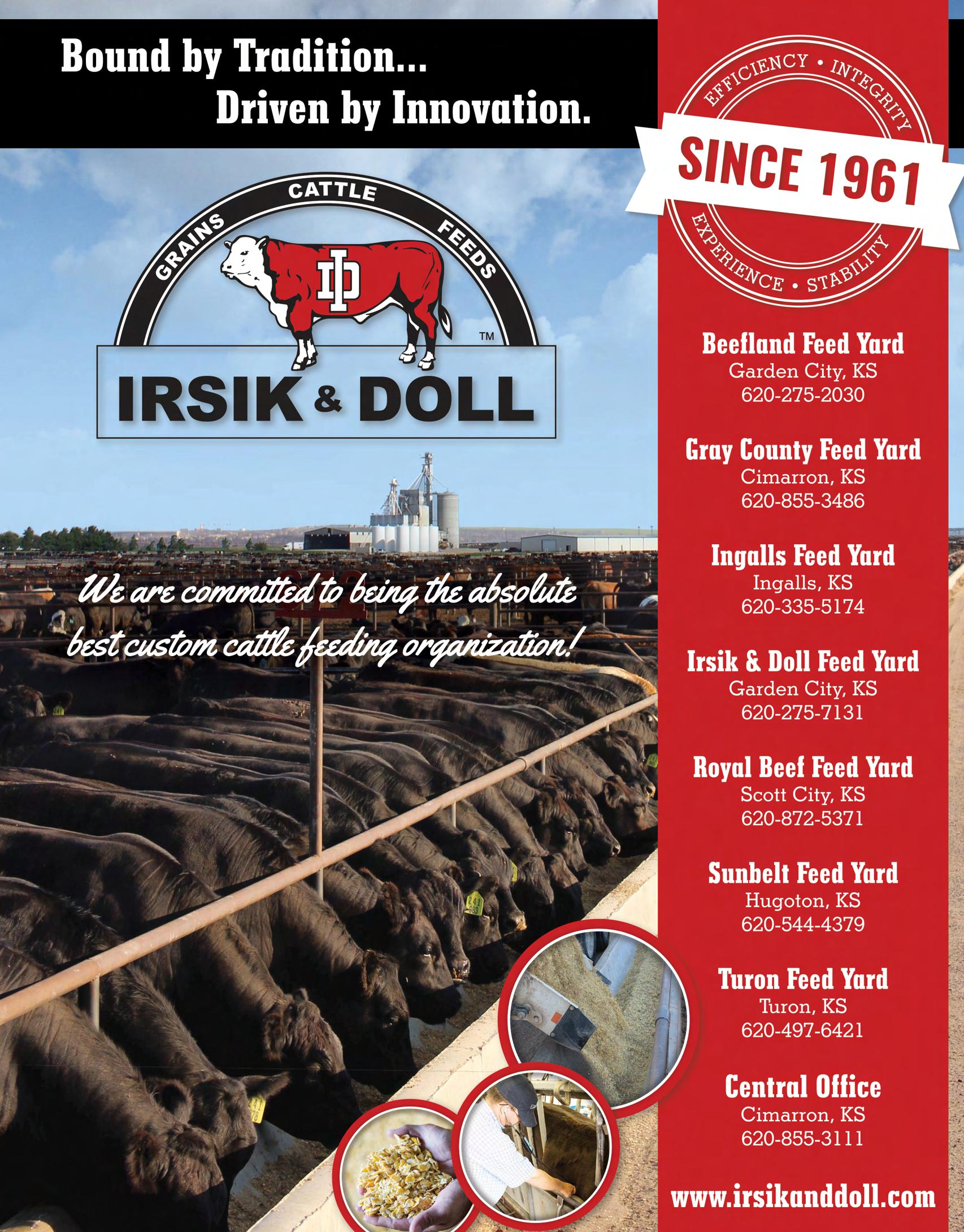





















 by Deb Thummel, Region 4 Vice President
by Deb Thummel, Region 4 Vice President








































































































































